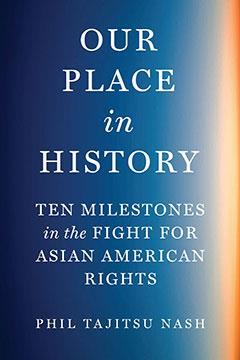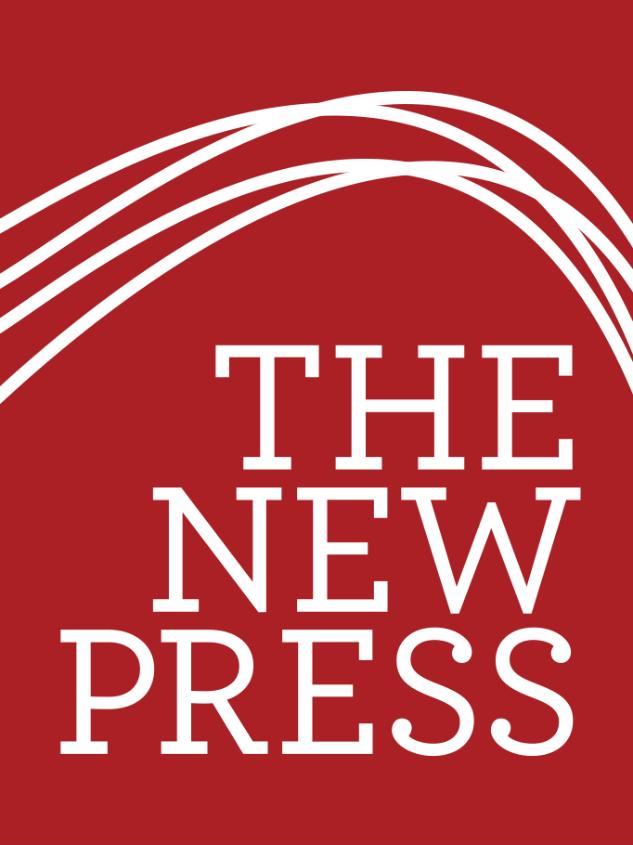
1 THE NEW PRESS London Book Fair 2024 www.thenewpress.com @thenewpress PUBLISHING IN THE PUBLIC INTEREST World rights represented by The New Press unless otherwise noted Ellen Adler, Publisher • eadler@thenewpress.com Marc Favreau, Director of Editorial Programs • mfavreau@thenewpress.com Sharon Swados, Rights Director • sswados@thenewpress.com The New Press, 120 Wall Street, 31st Floor, New York, NY 10005, U.S.A. T: 001.212.629.8802, F: 001.212.629.8617
Foreign Rights Representatives
Brazil
Laura Riff
João Paulo Riff
RIFF Agency
Avenida Calógeras n° 6, sl 1007, Centro
20030-070 Rio de Janeiro
Brazil
+55 (21) 2287 6299 tel laura@agenciariff.com.br joaopaulo@agenciariff.com.br
China
Meng-Ying Hsieh
Bardon-Chinese Media Agency
3F, No. 150, Sec. 2, Roosevelt Road
Taipei 100, Taiwan +886-2-2364-4995, ext. 43 tel mengying@bardonchinese.com
Eastern Europe
(excluding Poland and Romania) and Russia
Milena Kaplarevic
Prava I Prevodi
Blvd. Mihaila Pupina 10B/I 5th floor 11070 Belgrade
Serbia
+381 (11) 311 9880 tel +381 (11) 311 9879 fax milena@pravaiprevodi.org
France
Vanessa Kling
La Nouvelle Agence 7 Rue Corneille 75006 Paris
France
+33 (1) 4325 8560 tel
+33 (1) 4325 4798 fax vanessa@lanouvelleagence.fr
Germany
Dr. Uwe Neumahr
Agence Hoffman Hohenstaufenstraße 1 D-80801 München
Germany
+49 (89) 540 473 815 tel
+49 (89) 540 473 820 fax u.neumahr@agencehoffman.de
Greece
Nike Davarinou Read n Right Agency 26, Dimitriou Street, 34132 Chalkida
Greece
+30-222-102-9798 tel nike@readnright.gr readrght@ath.forthnet.gr www.readnright.gr
Italy
Erica Berla
Berla & Griffini Rights Agency via Gian Giacomo Mora 7, 20123 Milano
Italy
+39 02 80504179 tel https://www.bgagency.it/
Japan
Miko Yamanouchi
Japan UNI Agency, Inc. Tokyodo No.2 Bldg, 5F 1-27 Kanda-Jinbocho
Chiyoda-ku, Tokyo 101-0051
Japan
+81 (03) 3295 0301 tel miko.yamanouchi@japanuni.co.jp
Poland
Paulina Machnik
Graal Literary Agency ul. Pruszkowska 29/252 02-119 Warsaw
Poland
+48 (22) 895 2000 tel
+48 (22) 895 2001 fax paulina.machnik@graal.com.pl
Romania
Simona Kessler
International Copyright Agency Str. Banul Antonache 37 011663 Bucharest 1
Romania
+40 (21) 316 4806 tel
+40 (21) 316 4794 fax office@kessler-agency.ro
South Korea
Sue Yang
EYA (Eric Yang Agency)
3F. e B/D 20, Seochojungang-ro 33-gil, Seocho-gu, Seoul, 06593
Rep. of Korea
+82 2 592 3356 tel
+82 2 592 3359 fax sueyang@eyagency.com
Spain and Portugal
Mònica Martin
MB Agencia Literaria
Ronda Sant Pere 62 1°-2a 08010 Barcelona
Spain
+34 (93) 265 9064 tel
+34 (93) 232 7221 fax monica@mbagencialiteraria.es
Türkiye
Özlem Öztemel
Anatolialit Agency
Caferağa Mah. Gunesli Bahce Sok., No:48, Or.Ko. Apt., B Blok, D:4, 34710, Kadıkoy, Istanbul
Türkiye
+90 (216) 700 1088 tel
+9 (216) 700 1089 fax o.oztemel@anatolialit.com
UK
David Grossman
David Grossman Literary Agency 9 Lamington ST London W6 0HU
United Kingdom
+44 (208) 741 2860 tel general@dglal.co.uk.
Unless otherwise indicated, foreign rights are controlled by The New Press.
For all other inquiries, please contact: rights@thenewpress.com
2
Contents
Featured Titles
Another World Is Possible by Natasha Hakimi Zapata ● 6
From the Ground Up by Stephanie Anderson ● 8
Lies My Teacher Told Me: A Graphic Adaptation by James W. Loewen and Nate Powell ● 9
On Cuba by Noam Chomsky and Vijay Prashad ● 12
Sacred War by Theodore F. Cook and Haruko Taya Cook ● 14
The Sustainability Class by Vijay Kolinjivadi and Aaron Vansintjan ● 15
Activism and Social Justice
Our Place in History by Phil Tajitsu Nash ● 16
Policing White Supremacy by Mike German and Beth Zasloff ● 17
Climate Fiction “Cli-fi”
Afterglow edited by Grist ● 18
Climate Change/Sustainability and the Urban Elite/Clean Energy and Labor
Charging Forward by Chris Benner and Manuel Pastor ● 20
Power Lines edited by Jeff Ordower and Lindsay Zafir ● 21
We Are the Middle of Forever edited by Dahr Jamail and Stan Rushworth ● 23
Criminal Justice
Notes from an Abolitionist by Emile DeWeaver ● 25
A Second Chance by Frederic Block ● 26
History
A Plausible Man by Susanna Ashton ● 27
Disrupted City by Manan Ahmed Asif ● 28
The Price They Paid by Jeff Forret ● 29
The Trials of Madame Restell by Nicholas L. Syrett ● 30
Slaves for Peanuts by Jori Lewis ● 33
3
Labor and Union Movements
Labor’s Partisans by Nelson Lichtenstein and Samir Sonti ● 36
Organizing America by Erik Loomis ● 37
Photography and LGBTQ
Transcend by Sandra Chen Weinstein ● 38
Backlist Titles ● 39
STUDS TERKEL ● 40
Studs Terkel Backlist
NOAM CHOMSKY ● 43
Noam Chomsky Backlist
ANTIRACIST BESTSELLERS ● 44
Art on My Mind by bell hooks
Chokehold by Paul Butler
Lies My Teacher Told Me by James W. Loewen
The New Jim Crow by Michelle Alexander
Pushout by Monique W. Morris
Sundown Towns by James W. Loewen
Teaching When the World Is on Fire edited by Lisa Delpit
Thick by Tressie McMillan Cottom
SELECT BESTSELLING BACKLIST ● 45
Conspiracy in the Streets by Jon Wiener
The End of Ice by Dahr Jamail
Except for Palestine by Marc Lamont Hill and Mitchell Plitnick
Inventing Latinos by Laura E. Gómez
The Monster at Our Door by Mike Davis
Schooltalk by Mica Pollock
Troublemakers by Carla Shalaby
When We Were Arabs by Massoud Hayoun
4
MUST-HAVE HISTORICAL RELEASES ● 46
Big History by Cynthia Stokes Brown
Blood on the River by Marjoleine Kars
The Darker Nations by Vijay Prashad
The Dawn of Detroit by Tiya Miles
Lies My Teacher Told Me by James W. Loewen
A People’s History of Sports in the United States by Dave Zirin
To Poison a Nation by Andrew Baker
Truth Has a Power of Its Own by Howard Zinn with Ray Suarez
5
Featured Titles
Progressive Public Policies from Across the Globe

Another World Is Possible Lessons for America from Around the Globe
Natasha Hakimi Zapata
February 4, 2025
Hardcover
304 pages
World, all languages
REAL-WORLD SOLUTIONS TO AMERICA’S THORNIEST SOCIAL PROBLEMS FROM HOUSING TO RETIREMENT TO DRUG ADDICTION BASED ON ORIGINAL REPORTING FROM AROUND THE WORLD
“Learning what has already been accomplished elsewhere will open Americans’ imaginations to the kinds of progressive reforms that are not only attainable, but have already been proven to be wildly effective.” from the introduction
A new generation of Americans has declared that another world is possible. And yet, the stubborn problems of inequality, climate change, and declining health seem as intractable as ever. Where might different answers lie?
Intrepid journalist Natasha Hakimi Zapata has traveled around the world, from Costa Rica to Uganda, and Estonia to Singapore, uncovering how different countries solve the problems that plague the United States. Through in-depth reporting, including interviews with senior government officials, activists, industry professionals, and the ordinary people affected by their policies, Another World Is Possible examines innovative programs that address public health, social services, climate change, housing, education, addiction, and more.
In each instance Zapata provides a clear-eyed assessment of the history, challenges, costeffectiveness, and real-world impact of these programs. The result is a compelling, frameshifting account of how we might live differently and create a safer, healthier, more sustainable future.
A work of keen analysis as well as enormous heart and optimism, Another World Is Possible is destined to crack the mold of current debates, and to refresh our sense of what might be possible tomorrow.
Topics included in Another World Is Possible:
• Norway’ s family-friendly policies
• Uganda’ s open-door refugee policy
• New Zealand’ s public pension program
• United Kingdom’ s universal health care
• Portugal’ s drug decriminalization policy
• Finland’ s public education system
• Singapore’ s public housing
6
• Estonia’ s internet policies
• Costa Rica’ s biodiversity law
• Uruguay’ s renewable energy revolution
Natasha Hakimi Zapata is an award-winning journalist, university lecturer, and literary translator. Her work has appeared in The Nation, Los Angeles Review of Books, In These Times, Truthdig, Los Angeles Magazine, and elsewhere. The former foreign editor of Truthdig, she lives in London.
7
Featured Titles
Sustainable Food Chains Led by Women
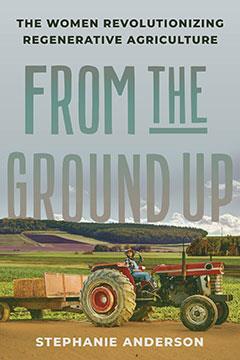
From the Ground Up The Women Revolutionizing Regenerative Agriculture
Stephanie Anderson
November 19, 2024
Hardcover
256 pages
World, all languages
AN AWARD-WINNING AUTHOR’S POWERFUL EXPLORATION OF THE REMARKABLE WOMEN DRIVING TRANSFORMATIVE CHANGE IN AMERICA’S FOOD SYSTEM
“Anderson is a strong new voice for an agriculture that works for public health, for nature, and for farmers.” Judith D. Schwartz, author of Cows Save the Planet, on Stephanie Anderson’s One Size Fits
None
It’s well known that our industrialized food system has abandoned priorities of nutrition and environmental stability in the pursuit of profit a model designed to fail, especially as climate change escalates. Yet this groundbreaking book describes a glimmer of hope: a green wave of diverse female farmers, entrepreneurs, community organizers, scientists, and political leaders who operate with the shared goals of combatting climate change through regenerative agriculture, redesigning the food system, and producing healthy, socially responsible food.
From the Ground Up, by journalist and award-winning author Stephanie Anderson, offers a journey into the root causes of our unsustainable food chain, revealing its detrimental reliance on extractive agriculture, which depletes soil and water, produces nutritionally deficient food, and devastates communities and farmers. Anderson then delivers an uplifting, deeply reported narrative of women-led farms and ranches nationwide, supported by women-led investment firms, farmer training programs, restaurants, supply chain partners, and advocacy groups, all working together to create a more inclusive and sustainable world.
From the Ground Up sheds light on a set of inspiring journeys, with stories that will transform the way we think about the food chain one that can weather the storms of climate change, conflicts, and global pandemics.
Stephanie Anderson is the author of the award-winning One Size Fits None: A Farm Girl’s Search for the Promise of Regenerative Agriculture. Her essays and short stories have appeared in outlets such as The Rumpus, TriQuarterly, Flyway, Midwestern Gothic, The Chronicle Review, and many others. She lives in South Florida.
8
Featured Titles
Graphic Nonfiction—American History
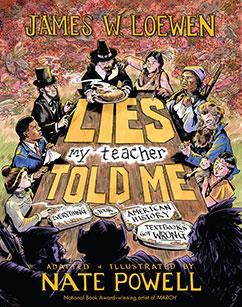
Lies My Teacher Told Me A Graphic Adaptation
James W. Loewen and Nate Powell
April 16, 2024
Hardcover
272 pages
World, all languages
AT LAST! THE LONG-AWAITED GRAPHIC VERSION OF THE MULTI-MILLION COPY BESTSELLING CORRECTIVE TO AMERICAN HISTORY MYTHS—ADAPTED BY THE FAMED NATIONAL BOOK AWARD–WINNING ARTIST BEHIND JOHN LEWIS’S MARCH TRILOGY
“Loewen’s book contains so much history that it ends up functioning not just as a critique, but also as a kind of counter-textbook that retells the story of the American past.” The Nation on Lies My Teacher Told Me
Since its first publication in the 1990s, Lies My Teacher Told Me has become one of the most important and successful and beloved history books of our time. As the late Howard Zinn said, “Every teacher, every student of history, every citizen should read this book.” Having sold well over 2 million copies, the book also won an American Book Award and numerous other commendations and prizes and was even heralded on the front page of the New York Times long after its first publication.
Now, the brilliant and award-winning artist Nate Powell the first cartoonist ever to win a National Book Award has adapted Loewen’s classic work into a graphic edition that perfectly captures both Loewen’s text and the irreverent spirit of his work. Eye-popping illustrations bring to life the true history chronicled in Lies My Teacher Told Me, and ample text boxes and callouts ensure nothing is lost in translation. The book is perfect for those making their first foray past the shroud of history textbooks, and it will also be beloved by those who had their worldviews changed by the original.
Nate Powell is the first cartoonist ever to win the National Book Award, for civil rights icon John Lewis’s March trilogy. Powell’s work has won a Robert F. Kennedy Book Award, three Eisner Awards, two Ignatz Awards, four YALSA Great Graphic Novels for Teens selections, and two Los Angeles Times Book Prize finalist selections. Powell has discussed his work at the United Nations, as well as on MSNBC’s The Rachel Maddow Show, CNN, PBS, and Free Speech TV. He lives in Bloomington, Indiana.
James W. Loewen (1942–2021) was the bestselling and award-winning author of Lies My Teacher Told Me, Lies Across America, Lies My Teacher Told Me About Christopher Columbus, Sundown Towns, and Lies My Teacher Told Me: Young Readers’ Edition (all from The New Press). He also wrote Teaching What Really Happened and The Mississippi Chinese: Between Black and White and edited The Confederate and Neo-Confederate Reader. He won
9
the American Book Award, the Oliver Cromwell Cox Award for Distinguished Anti-Racist Scholarship, the Spirit of America Award from the National Council for the Social Studies, and the Gustavus Myers Outstanding Book Award.
Praise for Lies My Teacher Told Me: A Graphic Adaptation: “This new iteration cleverly demonstrates Loewen’s key concepts while vividly bringing the content to life.”
Booklist
“James Loewen’s classic Lies My Teacher Told Me is an essential title in the pantheon of books that challenge commonly held racist historical assumptions about the past. This new graphic adaption will inspire even more readers, young and old, to interrogate these false narratives. Nate Powell’s wonderful illustrations capture Loewen’s sly humor and reverence for truth-telling and will entertain even as they inspire and teach.”
Ibram X. Kendi, National Book Award–winning author of Stamped from the Beginning: A Graphic History of Racist Ideas in America
“This updated version of Lies My Teacher Told Me NEEDS to be in every history classroom and incorporated into teacher education programs and coursework. Nate Powell’s captivating artwork adds depth and emotion that will help readers connect to our true, shared history in ways that prose alone cannot.”
Tim Smyth, social studies teacher and author of the Eisner-nominated Teaching with Comics and Graphic Novels
“Countless people have told me how their lives were changed by reading the original Lies My Teacher Told Me. . . . With Nate Powell’s skillful adaptation and creative illustrations, readers can see detailed examples of how, to quote Loewen, ‘history textbooks are anti-citizenship manuals, handbooks for acquiescence.’ This book will get young people asking the right questions and looking beyond textbooks for answers.”
Deborah Menkart, executive director of Teaching for Change and co-director of the Zinn Education Project
“Nate Powell’s emotive graphics add a vital new dimension to James Loewen’s razor-sharp critique of our nation’s textbooks. This collaboration will reach those with the most to gain: students still spoon-fed with constrained narratives masquerading as history.”
Ray Raphael, author of A People’s History of the American Revolution and Founding Myths
“James Loewen’s history of our country is everything most textbooks are not: critical, idea-rich, anti-racist, class-conscious and funny. Loewen’s irreverent storytelling comes to life in Nate Powell’s action-packed adaptation of Loewen’s classic Lies My Teacher Told Me. This volume is especially welcome at a moment when truthful history is under attack.”
—Bill Bigelow, curriculum editor of Rethinking Schools and co-director of Zinn Education Project
10

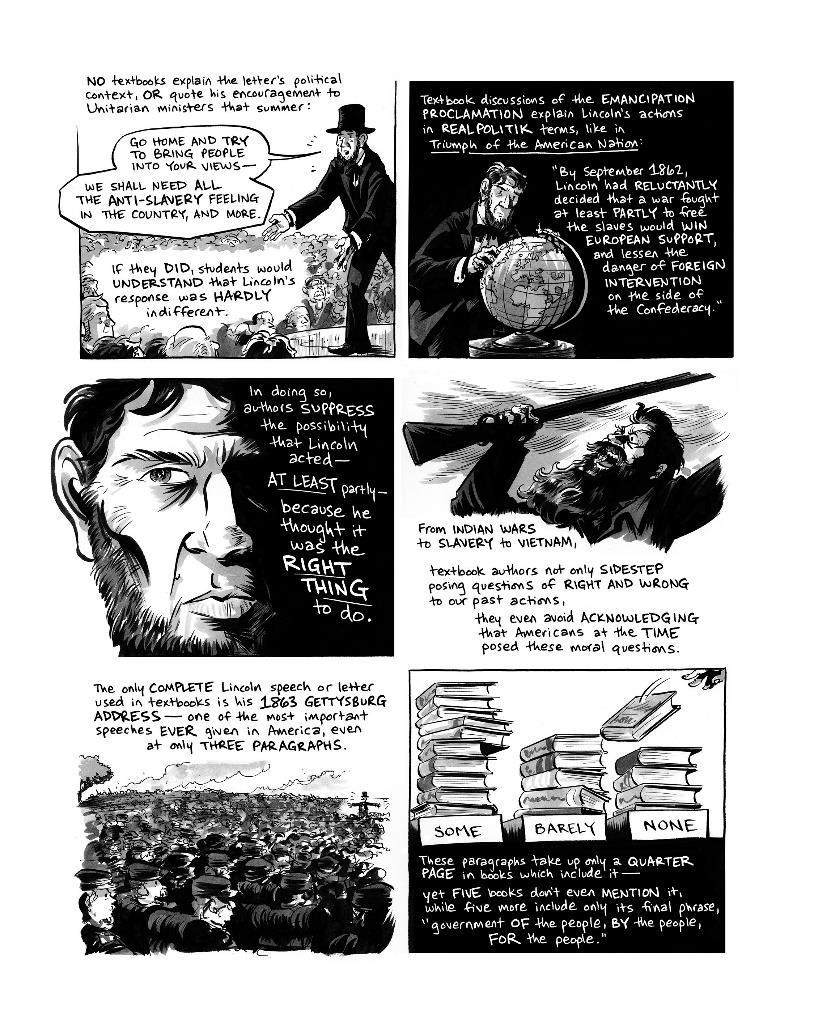
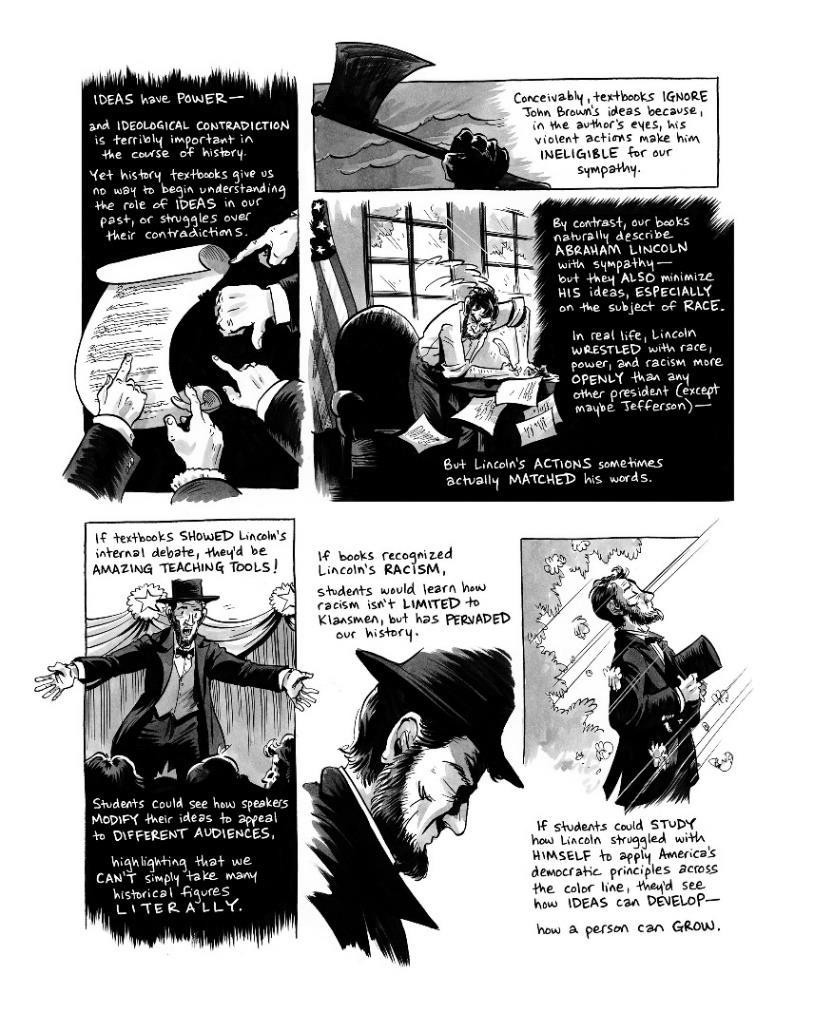
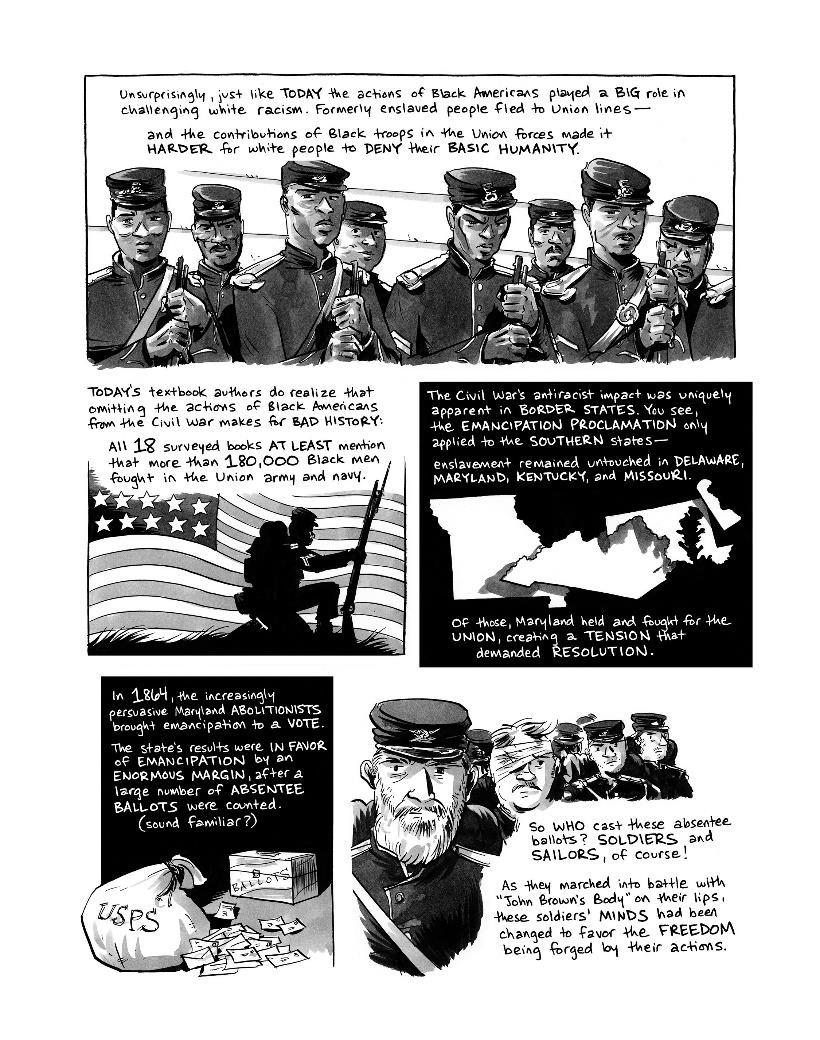
11
Featured Titles International Relations

On Cuba
Reflections on 70 Years of Revolution and Struggle
Noam Chomsky and Vijay Prashad
July 23, 2024
Hardcover
208 pages
All languages, excluding Danish and Portuguese AN INTIMATE CONVERSATION BETWEEN TOWERING PUBLIC INTELLECTUALS EXAMINING THE CONTENTIOUS INTERPLAY BETWEEN THE CUBAN REVOLUTION AND U.S. EMPIRE
An audacious revolutionary experiment in the backyard of empire, Cuba has occupied a vexed role in the international order for decades. Though its doctors (and fighters) and the outsized influence of its example have traversed the globe, from Venezuela to Angola, its political and economic future remain uncertain as the Castro era comes to a close and the U.S. embargo proceeds unabated.
Through an intimate conversation between two of the country’s most astute observers of international politics, Noam Chomsky and Vijay Prashad, On Cuba traces Cuban history from the early days of the 1950s revolution to the present, interrogating U.S. interventions and extracting lessons on U.S. power and influence in the Western Hemisphere along the way. Neither a jingoistic condemnation nor an uncritical celebration, Chomsky’s heterodox approach to world affairs is on full display as he and Prashad grapple with Cuba’s unique place on the international scene.
In a media landscape saturated with half-truths and fake news, Chomsky and Prashad “our own Frantz Fanon . . . [whose] writing of protest is always tinged with the beauty of hope” (Amitava Kumar, author of Immigrant, Montana) seek to shed light on the truth of a complex and perennially controversial nation, while examining the limits of mainstream media discourse.
FROM THE AUTHORS OF THE WITHDRAWAL
Praise for The Withdrawal: “A fierce and well-informed condemnation of U.S. imperialism.”
Publishers Weekly
“A collection of insightful geopolitical analysis.”
Kirkus Reviews
“This approachable book is recommended for readers interested in thought-provoking works on international relations and current affairs.”
Library Journal
Noam Chomsky is Institute Professor (emeritus) in the Department of Linguistics and Philosophy at the Massachusetts Institute of Technology and Laureate Professor of Linguistics and Agnese Nelms Haury Chair in the Program in Environment and Social Justice at the University of Arizona. A world-renowned linguist and political activist, he is the author of numerous books, including On Language, Understanding Power (edited by Peter R. Mitchell and John Schoeffel), American Power and the New Mandarins, For Reasons of State, Problems of Knowledge and Freedom, Objectivity and Liberal Scholarship, Towards a New Cold War,
12
The Essential Chomsky (edited by Anthony Arnove), On Anarchism, The Chomsky-Foucault Debate (with Michel Foucault), and The Withdrawal (with Vijay Prashad), all published by The New Press. He lives in Tucson, Arizona.
Vijay Prashad is director of Tricontinental: Institute for Social Research, editor of LeftWord Books, and the chief correspondent for Globetrotter. He is the author of The Darker Nations: A People’s History of the Third World, Uncle Swami: South Asians in America Today, and coauthor (with Noam Chomsky) of The Withdrawal (all published by The New Press), as well as Washington Bullets The Darker Nations was chosen as a Best Nonfiction Book of the Year by the Asian American Writers’ Workshop and won the Muzaffar Ahmad Book Prize. He lives in Santiago, Chile, and Northampton, Massachusetts.
13
Featured Titles History
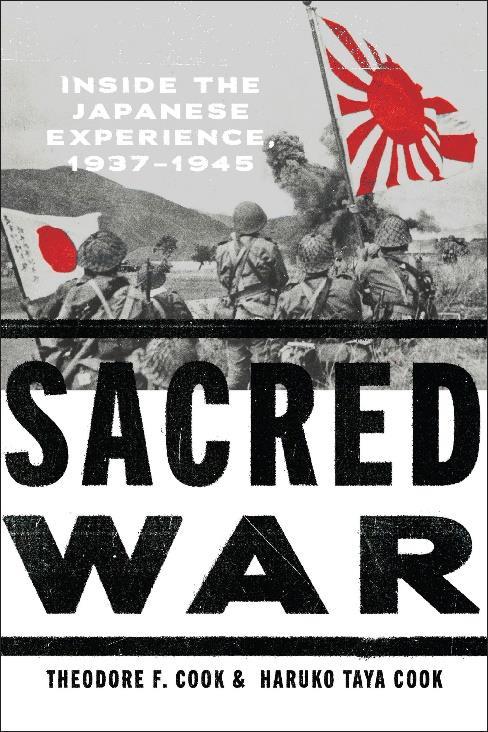
Sacred War
Inside the Japanese Experience, 1937–1945
Theodore F. Cook and Haruko Taya Cook
December 10, 2024
Hardcover
352 pages
World, all languages
THE
FIRST EFFORT TO RECONSTRUCT THE HISTORY OF THE PACIFIC WAR EXCLUSIVELY FROM INTERNAL JAPANESE SOURCES, FROM THE RENOWNED HISTORIANS
A magisterial work of political, social, and military history, Sacred War sets a new standard for understanding the events that forever transformed America, Japan, and the world.
Celebrated historians Theodore F. and Haruko Taya Cook, whose oral history of the Pacific war was called “one of the essential books about World War II” (Philadelphia Inquirer), now offer a shattering new history of Japan’s long war in the Pacific, told exclusively from the perspective of the Japanese. Sacred War draws on a rich trove of documents, much of it first-person and almost all of it previously inaccessible to Western scholars. Based on painstaking research, here is World War II through the eyes of the Japanese themselves: ordinary people on the home front, soldiers on the front lines, and the military and political leadership who drove Japan to near annihilation by 1945.
Sacred War reveals both the internal logic of an authoritarian society bent on victory at all costs including, in the final twelve months of the war, over one million civilian deaths as well as heartrending accounts of the unfolding conflict, from the disease-ridden beaches on Guadalcanal to the burnt-out streets of Hiroshima, following the nuclear attacks by the United States that brought the war to its devastating end.
Theodore F. Cook is a professor emeritus of history and former director of the Asian studies program at William Paterson University. The co-author with Haruko Taya Cook of Japan at War (The New Press), he lives in New York City.
The late Haruko Taya Cook was a professor emerita in history at Marymount College of Fordham University and the co-author (with Theodore F. Cook) of Japan at War (The New Press).
14
Featured Titles
Climate Change/Sustainability and the Urban Elite/Clean Energy and Labor
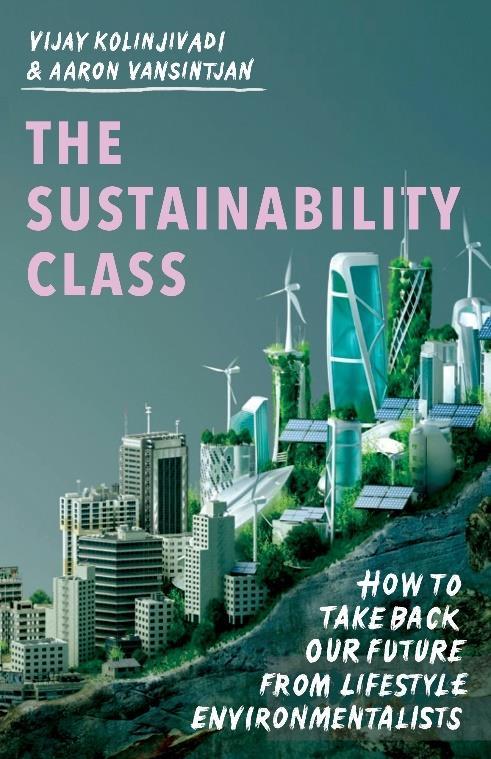
The Sustainability Class How to Take Back Our Future from Lifestyle Environmentalists
Vijay Kolinjivadi and Aaron Vansintjan
December 3, 2024
Hardcover
240 pages
World, all languages
AN ORIGINAL ARGUMENT THAT ENVIRONMENTAL SUSTAINABILITY HAS BEEN CO-OPTED BY THE URBAN ELITE, ALONG WITH EXAMPLES FROM AROUND THE WORLD OF WAYS WE CAN SAVE OUR PLANET
“Caring for the environment means reclaiming ecology for everyone.” from the introduction
With more urban residents interested in living sustainably, we have seen the emergence of a green-tech service economy premised around a kind of “lifestyle environmentalism.”
Concerns over sustainability have been co-opted to sell a high-tech urban lifestyle, causing cities to become more unequal and unsustainable, cementing the elite’s status, and excluding the working class, racial minorities, and women.
Focusing on what they term the “sustainability class” a wealthy set of urbanites convinced that we can save the planet from ecological breakdown through individual actions, green and smart urbanism, green finance, and technological efficiency authors Vijay Kolinjivadi and Aaron Vansintjan challenge many of the popular ideas about saving the planet. It is actually the approach of the sustainability class itself, the authors argue, that is unsustainable; improving eco-efficiency within a capitalist, growth-oriented system will neither save us nor lead to true sustainability.
Vivid and conversational but also challenging, The Sustainability Class explores how investors all over the world are rushing to capitalize on going green. By contrast, using real-world examples of housing and energy strategies, food production, transport, tourism, and waste management, they show how ordinary people around the world are truly building a more ecological future through collective organization in their everyday lives. In doing so, they reclaim ecology and true sustainability for everyone, so it is no longer just the domain of an elite who seek to devise more sophisticated ways to shift the costs of their “greener than thou” lifestyles onto the rest of us.
Vijay Kolinjivadi is a postdoctoral fellow at the Institute of Development Policy at the University of Antwerp, a writer with the Earth Negotiations Bulletin, and co-editor of the website Uneven Earth. He has been published in Al Jazeera, New Internationalist, Truthout, and The Conversation. He lives in Antwerp.
Aaron Vansintjan is the founder and co-editor of Uneven Earth and co-author of The Future Is Degrowth. He has been published in The Guardian, Truthout, Open Democracy, and The Ecologist. He lives in Montreal.
15
Activism and Social Justice
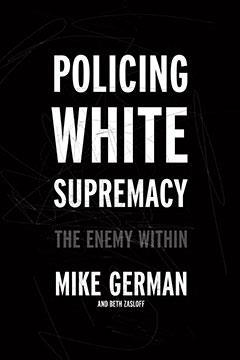
Policing White Supremacy
The Enemy Within
Mike German and Beth Zasloff
September 3, 2024
Hardcover
256 pages
World, all languages
A FORMER FBI AGENT’S URGENT CALL FOR LAW ENFORCEMENT TO PRIORITIZE FAR-RIGHT VIOLENCE AND END TOLERANCE FOR POLICE RACISM
As a long-serving FBI agent, Mike German worked undercover in white supremacist and militia groups, developing a deep understanding of their mindsets and strategies. In Policing White Supremacy, German issues a wake-up call about law enforcement’s dangerously lax approach to far-right violence.
Because the FBI refuses to prioritize violence by white supremacists, it can continue to use its domestic terrorism powers to target much less violent groups, such as Black Lives Matter and environmental activists. By contrast, far-right militants have committed over one hundred deadly acts just since the 2017 Unite the Right rally in Charlottesville, Virginia, and attempted to obstruct transfer of power to a duly elected U.S. president.
Noting that the FBI does not even compile accurate national data on white supremacist violence, German exposes tolerance of overt racism in law enforcement and police membership in white supremacist organizations. The threat these officers pose became clear when at least nineteen current and former law enforcement officials participated in the January 6 breach of the Capitol. A book with profound relevance as we head into what is sure to be a contentious presidential election, Policing White Supremacy urges us to recognize and address a serious threat to democracy.
Mike German is a fellow with the Liberty and National Security program at the Brennan Center for Justice at NYU Law School. He has worked at the ACLU and served sixteen years as an FBI special agent. He is the author of Thinking Like a Terrorist as well as Disrupt, Discredit, and Divide: How the New FBI Damages Our Democracy.
Beth Zasloff is the author of Hold Fast to Dreams: A College Guidance Counselor, His Students, and the Vision of a Life Beyond Poverty, written in collaboration with her husband, Joshua Steckel (published by The New Press). Beth has taught writing at New York University, Johns Hopkins, and in New York City public schools. She is director of the Midtown Workmen’s Circle School, a progressive Jewish community, and co-author, with Edgar M. Bronfman, of Hope, Not Fear: A Path to Jewish Renaissance. She is a graduate of Yale University and the Johns Hopkins University Writing Seminars and lives in Brooklyn.
17
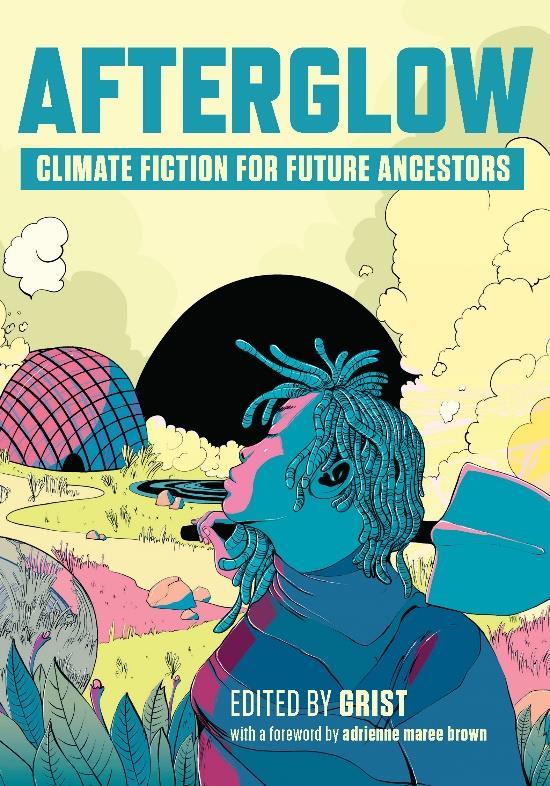
Afterglow Climate Fiction for Future Ancestors
Edited
by Grist
February 7, 2023
Paperback
256 pages
World, all languages
HOPEFUL AND FORWARD-LOOKING FUTURISTIC SHORT STORIES THAT EXPLORE HOW THE POWER OF STORYTELLING CAN HELP CREATE THE WORLD WE NEED
“This is a glorious book that challenges our conceptions of bookmaking as much as it questions our conceptions of worldbuilding. We, as earthlings, will be better to the earth after experiencing this book. That is not hyperbole.” —New York Times bestselling author Kiese Laymon
Afterglow is a stunning collection of original short stories in which writers from many different backgrounds envision a radically different climate future. Published in collaboration with Grist, a nonprofit media organization dedicated to telling stories of climate solutions, these stirring tales expand our ability to imagine a better world.
Inspired by cutting-edge literary movements, such as Afrofuturism, hopepunk, and solarpunk, Afterglow imagines intersectional worlds in which no one is left behind where humanity prioritizes equitable climate solutions and continued service to one’s community. Whether through abundance or adaptation, reform, or a new understanding of survival, these stories offer flickers of hope, even joy, as they provide a springboard for exploring how fiction can help create a better reality.
Pieces Included:
“When It’s Time to Harvest” by Renan Bernardo
“Afterglow” by Lindsey Brodeck
“The Case of the Turned Tide” by Savitri Horrigan
“El, the Plastotrophs, and Me” by Tehnuka
“A Séance in the Anthropocene” by Abigail Larkin
“Tidings” by Rich Larson
“A Worm to the Wise” by Marissa Lingen
“The Secrets of the Last Greenland Shark” by Mike McClelland
“Canvas Wax Moon” by Ailbhe Pascal
“Broken from the Colony” by Ada M. Patterson
“The Cloud Weaver’s Song” by Saul Tanpepper
Afterglow welcomes a diverse range of new voices into the climate conversation to envision the next 180 years of equitable climate progress. A creative work rooted in the realities of our present crisis, Afterglow presents a new way to think about the climate emergency one that blazes a path to a clean, green, and more just future.
“The Tree in the Back Yard” by Michelle Yoon
18
Climate Fiction “Cli-fi”
Grist is a nonprofit, independent media organization dedicated to telling stories of climate solutions and a just future. Its goal is to use the power of storytelling to illuminate the way toward a better world, inspire millions of people to walk that path with us, and show that the time for action is now.
Praise for Afterglow:
“
[Afterglow] approaches climate change with hope for the radically different futures humans might create.”
The New York Times Book Review
“This short story collection radiates radical imagination. . . . If you’re feeling bouts of climate anxiety or even apocalypse fatigue, Afterglow will remind you to keep the faith.”
Sierra magazine
“The twelve stories in the anthology Afterglow: Climate Fiction for Future Ancestors . . . take readers into the future and across the globe to witness how humanity has persevered in the face of climate-crisis-induced destruction.”
ZYZZYVA
“This sparkling anthology of 12 climate fiction stories distinguishes itself with its hopeful bent. . . . Offering a glimpse at imagined futures across the globe, this is a welcome lift to the spirits to those who may be struggling to see any brightness amid climate fears.”
Publishers Weekly
“The art of storytelling is not only an act of memory and imagination, but one of hope and faith. These vivid and provocative stories represent a dreaming, a collective vision of future worlds where humanity has gathered itself, shared resources and wisdom, to arrive at a place of intentional action, health, and thriving. It is no small feat on the page or beyond to engage in such brave work. The tales of Afterglow offer the glimmers of possibility, the hard choices to be made, and the radiance of worlds not yet known but deeply needed.”
Sheree Renée Thomas, author of Black Panther: Panther’s Rage and Nine Bar Blues
“Ultimately, I hope these stories reveal how our imaginations can help build a better reality not only to serve as a guiding light, but to serve as a balm for these current, difficult times.”
Morgan Jerkins, bestselling author of This Will Be My Undoing
Rights Sold:
Booksea: Korean
Editions de L’oeil d’Or: French Serial Excerpt
19
Climate Change/Sustainability and the Urban Elite/Clean Energy and Labor
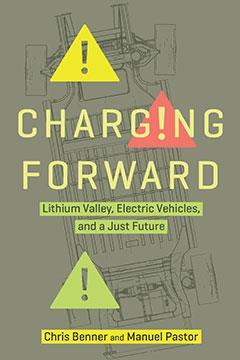
Charging Forward
Lithium Valley, Electric Vehicles, and a Just Future
Chris Benner and Manuel Pastor
October 22, 2024
Hardcover
224 pages
World, all languages
A CLARION CALL FOR JUSTICE AND DEMOCRACY IN THE QUEST FOR CLEAN ENERGY
California’s Salton Sea region is home to some of the worst environmental health conditions in the country. Recently, however, it has also become ground zero in the new “lithium gold rush” the race to power the rapidly expanding electric vehicle and renewable energy storage market. The immense quantities of lithium lurking beneath the surface have led to predictions that the region could provide a third of global demand. But who will benefit from the development of this precious resource?
A work of stunning analysis and reporting, Charging Forward shows that the questions raised by Lithium Valley lie at the heart of the “green transition.” Threading movement politics, federal policy, and autoworker struggles, noted experts Chris Benner and Manuel Pastor stress that getting the lithium out from under the earth is just a first step: the real question is whether the region and the nation will get out from under the environmental degradation, labor exploitation, and racial injustice that have been as much a part of the landscape as the Salton Sea itself.
What happens in Lithium Valley, the authors argue, will not stay there. This tiny patch of California is a microcosm of the broad climate challenges we face; understanding Lithium Valley today is the key to grasping the future of our economy and our planet.
Chris Benner is the director of the Institute for Social Transformation and the Everett Program for Technology and Social Change at UC Santa Cruz, where he is also the Dorothy E. Everett Chair in Global Information and Social Entrepreneurship, and a professor of environmental studies and sociology. He has co-authored five books with Manuel Pastor, including Equity, Growth and Community: What the Nation Can Learn From America’s Metro Areas, Solidarity Economics: Why Mutuality and Movements Matter. He lives in Santa Cruz, California.
Manuel Pastor is the director of the Equity Research Institute at the University of Southern California where he is also a Distinguished Professor of Sociology and American Studies and Ethnicity and the inaugural holder of the Turpanjian Chair in Civil Society and Social Change. He has co-authored five books with Chris Benner, including Equity, Growth and Community: What the Nation Can Learn From America’s Metro Areas, Solidarity Economics: Why Mutuality and Movements Matter. Pastor is also the author of State of Resistance: What California’s Dizzying Descent and Remarkable Resurgence Mean for America’s Future (The New Press). He lives in Los Angeles.
20
Climate Change/Sustainability and the Urban Elite/Clean Energy and Labor Power Lines
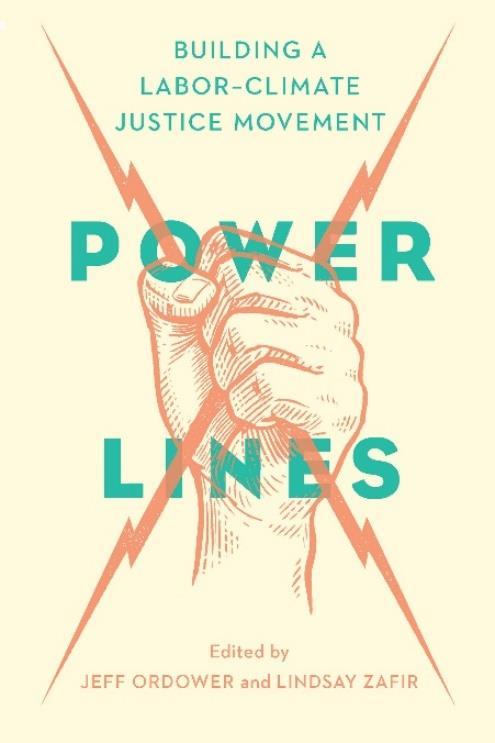
Building a Labor–Climate Justice Movement
Edited by Jeff Ordower and Lindsay Zafir
February 6, 2024
Paperback
240 pages
World, all languages
THE ESSENTIAL ANTHOLOGY ON THE MOST EFFECTIVE WAYS TO ORGANIZE A LABOR MOVEMENT FOR ENVIRONMENTAL JUSTICE, FROM LEADING ORGANIZERS IN THE FIELD
The corporate elite have long pitted climate and labor movements against each other through a “jobs vs. the environment” narrative that maximizes profits. But over the last few years, labor unions and climate organizers have been pushing back against this framework and organizing for a real just transition.
Featuring contributions from key organizers in climate justice and labor, Power Lines tackles the most pressing questions facing those who are trying to build a movement for economic and environmental justice. The collection provides practical organizing models and strategies as well as inspiration for the possibility of making change on climate.
Power Lines moves beyond an analysis of the class politics of climate change or the strategic imperative of federal climate legislation, making the case for the urgency of a robust labor–climate justice movement. It also shows us how we can build that movement by sharing some of the most creative and effective organizing happening on the ground right now.
Jeff Ordower is the North America director of 350.org. Prior to joining 350, he was a cofounder of the Green Workers Alliance. He lives in Philadelphia.
Lindsay Zafir is a distinguished lecturer at City College of New York and the academic director of Leadership for Democracy and Social Justice. She is the former editor of The Forge: Organizing Strategy and Practice. She lives in New York City.
21
Praise for Power Lines:
“A positive look at how using organized labor strategies has proven beneficial in environmental organizing efforts.”
Library Journal
“The environmental movement and the labor movement need to overlap and pollinate each other, with the tools for organizing and analysis that each possess. This compelling anthology offers a wealth of advice on how to make that task happen.”
Bill McKibben, author of The Flag, the Cross, and the Station Wagon
“Both community and labor must partner and fight together. The essays in Power Lines provide powerful examples of how other cities have taken the challenge of weaving together the strands of our movement for the collective power we need to save us, to save the world.”
Lauren Jacobs, executive director, PowerSwitch Action
“Power Lines shows that we do not need to start at square one in building a labor–climate justice movement. Rather, we can draw rich lessons from organizing that has taken place over the past two decades.”
Mark Engler and Paul Engler, authors of This Is an Uprising
“The climate movement needs the labor movement to win a just transition. Power Lines is an essential how-to manual for organizers looking for the most creative, visionary, and practical strategies to bridge our movements.”
Varshini Prakash, executive director, Sunrise Movement
“This book is a necessary corrective to the idea that creating economic prosperity for workers and communities comes at the expense of climate action. In fact, pursuing both goals is not only possible but happening all around us!”
May Boeve, executive director, 350.org and 350 Action Fund
“Power Lines is a powerful book that highlights how increasing numbers of unions are engaging in deep and important political education work with their members about the role of their employers in profiting by ravaging the planet.”
—Stephen Lerner, labor and community organizer and architect of the Justice for Janitors campaign
“This collection clarifies the central question that must animate our organizing: How do we build the kind of power that can help ordinary people re-shape the world?”
—Alex Han, In These Times
“Power Lines presents critical case studies on advancing all communities towards a just transition. The book provides key insights directly from the frontlines on how we can organize our communities towards collective power, navigate tensions, and truly advance change.”
—Shantell Bingham, organizing director of Climate Justice Alliance
“This book . . . shows us that new kinds of unions and unlikely political coalitions are not just possible: they’re already here. The organizers here give an honest accounting of their failures as well as successes as they build the green economy, one farm worker cooperative or resilience hub at a time.”
Sarah Jaffe, author of Work Won’t Love You Back and Necessary Trouble
22
Climate Change/Sustainability and the Urban Elite/Clean Energy and Labor
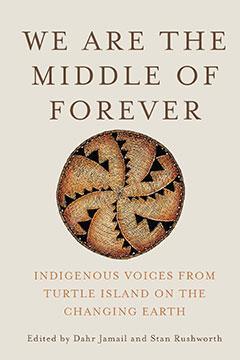
We Are the Middle of Forever Indigenous Voices from Turtle Island on the Changing Earth
Edited by Dahr Jamail and Stan Rushworth
April 9, 2024
Paperback
416 pages
World, all languages
A POWERFUL, INTIMATE COLLECTION OF CONVERSATIONS WITH INDIGENOUS AMERICANS ON THE CLIMATE CRISIS AND THE EARTH’S FUTURE
“This is a book whose reading is medicine, a beautiful invitation to a more sacred world in the company of some of the brightest stars of contemporary Indigenous activism.” Raj Patel, co-author (with Rupa Marya) of Inflamed: Deep Medicine and the Anatomy of Injustice
Although for a great many people, the human impact on the Earth countless species becoming extinct, pandemics claiming millions of lives, and climate crisis causing worldwide social and environmental upheaval was not apparent until recently, this is not the case for all people or cultures. For the Indigenous people of the world, radical alteration of the planet, and of life itself, is a story that is many generations long. They have had to adapt, to persevere, and to be courageous and resourceful in the face of genocide and destruction and their experience has given them a unique understanding of civilizational devastation.
An American Library Association Notable Book, We Are the Middle of Forever places Indigenous voices at the center of conversations about today’s environmental crisis. The book draws on interviews with people from different North American Indigenous cultures and communities, generations, and geographic regions, who share their knowledge and experience, their questions, their observations, and their dreams of maintaining the best relationship possible to all of life. A welcome antidote to the despair arising from the climate crisis, We Are the Middle of Forever will be an indispensable aid to those looking for new and different ideas and responses to the challenges we face.
Dahr Jamail is the author of Beyond the Green Zone: Dispatches from an Unembedded Journalist in Occupied Iraq as well as The End of Ice: Bearing Witness and Finding Meaning in the Path of Climate Disruption (from The New Press). He has won the Martha Gellhorn Prize for Journalism and the Izzy Award. He lives in Washington State.
Stan Rushworth is a teacher of Native American literature and the author of Sam Woods: American Healing, Going to Water: The Journal of Beginning Rain, Diaspora’s Children He lives in Northern California.
23
Praise for We Are the Middle of Forever:
“A refreshingly unique and incredibly informative collection of vital Indigenous wisdom.”
Kirkus Reviews (starred review)
“Insights like these, and dozens more, deserve deep attention and will hopefully spur readers into action to save the planet and themselves.”
Booklist (starred review)
“A timely and necessary volume that includes the perspectives and honesty of seasoned thinkers and powerful new voices. We Are the Middle of Forever is, at its core, a call to stop, listen closely, and think and act with humility when it comes to identifying and applying Nativesourced wisdom and solutions to the problems facing humanity.”
Tsim D. Schneider, citizen of the Federated Indians of Graton Rancheria, assistant professor of anthropology at the University of California, Santa Cruz, and author of The Archaeology of Refuge and Recourse
“Twenty heartfelt Indigenous reflections invite us to contemplate relationships and reciprocity, kinship and connection, responsibilities, and obligations. They encourage us to challenge our own colonial assumptions in the hopes that we can ‘find the tools we need to fix what we’ ve broken’ while we still can.”
Martin Rizzo-Martinez, author of We Are Not Animals: Indigenous Politics of Survival, Rebellion, and Reconstitution in Nineteenth-Century California
“These testimonies are exact, explicit, essential, clearly from the heart, articulate in their ways. When we finish reading and incorporating each word, we will know how to live. The path we are each called to walk will be clear.”
Deena Metzger, author of A Rain of Night Birds
“This book proves what many already know to be true, but which many more need to hear: Indigenous people are the heroes of the climate justice movement. The contributors to We Are the Middle of Forever ask us to join them in a march towards a future that has been prophesized a glittering future of abundance, cooperation, and peace. Whether or not we follow their vision will determine the fate of all.”
Melanie Yazzie, co-author of The Red Deal: Indigenous Action to Save Our Earth Rights Sold: Matthes & Seitz: German
24
Criminal Justice
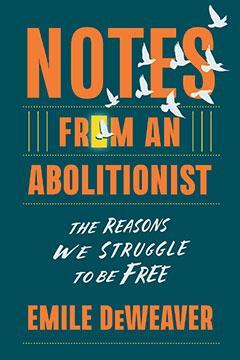
Notes from an Abolitionist
The Reasons We Struggle to Be Free
Emile DeWeaver
February 18, 2025
Hardcover
240 pages
World, all languages
A GROUNDBREAKING INVESTIGATION INTO THE INSIDIOUS WAYS THAT WHITE SUPREMACY COMPROMISES MAINSTREAM CRIMINAL JUSTICE “REFORM” MOVEMENTS, FROM THE AWARDWINNING, FORMERLY INCARCERATED ACTIVIST AND SOROS JUSTICE FELLOW
“Incarceration helped me to develop as an artist only in the regard that the more deeply you are oppressed, the more clearly you see the mechanisms of oppression and how they function without all of the window dressing.” Emile DeWeaver
Despite reform efforts that have grown in size and intensity over the last two decades, the machine of American mass incarceration continues to flourish. After spending more than twenty years in prison, formerly incarcerated activist, essayist, and organizer Emile DeWeaver believes the root of the problem is white supremacy. During his time in prison, DeWeaver covertly organized to pass legislation impacting juveniles in California’s criminal legal system; was a culture writer for Easy Street Magazine; and co-founded Prison Renaissance, an organization centering incarcerated voices and creating new models of incarcerated leadership. His sentence was ultimately commuted by California’s governor due to his community work.
In Notes from an Abolitionist, DeWeaver draws on these experiences and more from his own life story to critique the central premise of parole boards and prisoner rehabilitation programs as fundamentally re-entrenching white supremacist ideas. He argues that these programs demand self-abnegation of individuals while ignoring the role of structural oppression.
With lucid, urgent prose, DeWeaver intervenes in contemporary debates on the criminal legal system with his eye-opening discussion on the tools we need to end white supremacy. For readers of Susan Burton and Derecka Purnell, Notes from an Abolitionist adds a sharp and unique perspective to the growing discourse on abolition and white supremacy.
Emile Suotonye DeWeaver is a formerly incarcerated activist, widely published essayist, owner of Re:Frame LLC, and a 2022 Soros Justice Fellow. California’s Governor Brown commuted his life sentence after twenty-one years for his community work. He has written for publications including the San Francisco Chronicle, the San Jose Mercury News, Colorlines, The Appeal, The Rumpus, and Seventh Wave. He lives in Oakland, California.
25
Criminal Justice

A Second Chance
A Federal Judge Decides Who Deserves It
Judge Frederic Block
September 17, 2024
Hardcover
224 pages
World, all languages
A SITTING FEDERAL JUDGE’S LIVELY AND PROVOCATIVE RECOUNTING OF SIX CASES, TO MAKE THE ARGUMENT FOR REVISITING OVERLY PUNITIVE SENTENCES
“I am letting two murderers sentenced to life out of prison.” Judge Frederic Block, quoted in The Daily News
Murderous mafia capos. The police officer who brutalized Abner Louima. A purveyor of child pornography. These are some of the defendants to have come before Judge Frederic Block to ask for reductions in their prison sentences. All of them have been found guilty and have already served decades in prison, but under the 2018 First Step Act they are entitled to petition for reconsideration and release.
In a rare glimpse behind the bench, Judge Block recounts the cases of six incarcerated people who have done heinous things but have nevertheless petitioned him for their release. He then explains the criteria the First Step Act has spelled out for his consideration. And, in a novel twist, he asks the reader, “What would you do?”
Judge Block puts us out of our suspense in a third section of the book, where he tells us what he did do in each case and why, as he weighs each compassionate release request, evaluating issues ranging from “the trial tax,” to sentencing disparities, to judicial incompetence. Finally, Judge Block makes the compelling case that the First Step Act should be extended to state court judges, who hear 90 percent of all criminal cases. In a book that could be the basis for a new season of Law and Order, Judge Block challenges our ideas about punishment and justice.
Frederic Block is a U.S. District Court judge for the Eastern District of New York. He has been at the forefront of releasing prisoners and has received both praise and grief in the media. The author of several books, including the novel Race to Judgment, he lives in New York City.
26
History

A Plausible Man
The True Story of the Escaped Slave Who Inspired Uncle Tom’s Cabin
Susanna Ashton
August 6, 2024
Hardcover
368 pages
World, all languages
THE REMARKABLE LIFE STORY OF THE MAN BEHIND THE BOOK THAT HELPED SPARK THE CIVIL WAR, IN A STUNNING HISTORICAL DETECTIVE STORY
“I love this research.” Henry Louis Gates Jr., at a Hutchins Center presentation of Susanna Ashton’s findings
In December of 1850, a faculty wife in Brunswick, Maine, named Harriet Beecher Stowe hid a fugitive slave in her house. While John Andrew Jackson stayed for only one night, he made a lasting impression: drawing from this experience, Stowe began to write Uncle Tom’s Cabin, one of the most influential books in American history and the novel that helped inspire the overthrow of slavery in the United States.
A Plausible Man unfolds as a historical detective story, as Susanna Ashton combs obscure records for evidence of Jackson’s remarkable flight from slavery to freedom, his quest to liberate his enslaved family, and his emergence as an international advocate for abolition. This fresh and original work takes us through the Civil War, Reconstruction, and the restoration of white supremacy where we last glimpse Jackson losing his freedom again on a Southern chain gang. And in a riveting encounter, Ashton meets Jackson’s descendants in South Carolina and they are introduced to his epic biography for the first time.
In the spirit of Tiya Miles’s prizewinning All That She Carried and Erica Armstrong Dunbar’ s Never Caught, Susanna Ashton breathes life into a striving and nuanced American character, one unmistakably rooted in the vast sweep of nineteenth-century America.
Susanna Ashton is professor of English at Clemson University. An expert on slavery and freedom narratives, she was a Du Bois fellow at Harvard’s Hutchins Center, a fellow with Yale’ s Gilder Lehrman Center, and a Fulbright scholar. The author of Collaborators in Literary America, 1870–1920, she lives in Clemson, South Carolina.
27
History
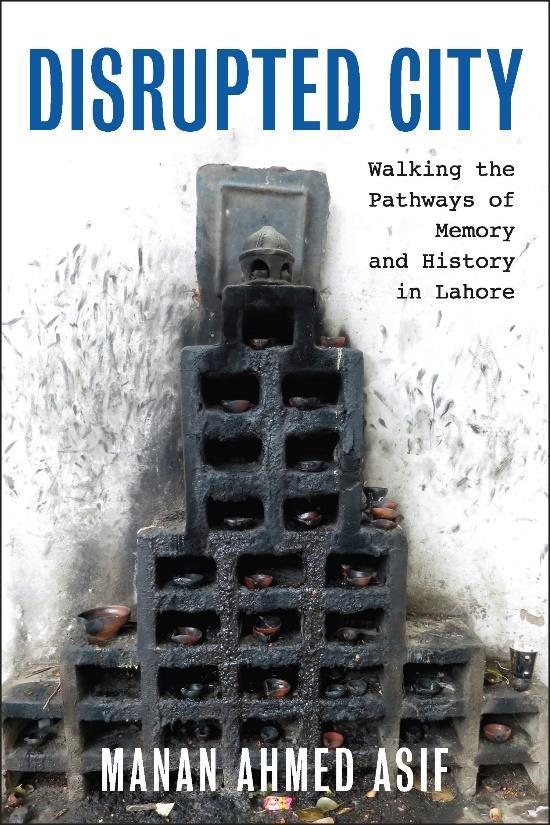
Disrupted City
Walking the Pathways of Memory and History in Lahore
Manan Ahmed Asif
October 22, 2024
Hardcover
384 pages
World, all languages
A STUNNING HISTORY OF PAKISTAN’S CULTURAL AND INTELLECTUAL CAPITAL, FROM ONE OF THE PREEMINENT SCHOLARS OF SOUTH ASIA
The city of Lahore was more than one thousand years old when it went through a violent schism. As the South Asian subcontinent was partitioned in 1947 to gain freedom from Britain’s colonial hold and the Islamic Republic of Pakistan was formed, the city’s large Hindu and Sikh populations were pushed toward India, and an even larger Muslim refugee population settled in the city. This was just the latest in a long history of the city’s making and unmaking.
Over the centuries, the city has kept a firm grip on the imagination of travelers, poets, writers, and artists. More recently, it has been journalists who have been drawn to the city as a focal point for a nation that continues to grab international headlines. For this book, acclaimed historian Manan Ahmed Asif brings to life a diverse and vibrant world by walking the city again and again over the course of many years. Along the way he joins Sufi study circles and architects doing restoration in the medieval parts of Lahore and speaks with a broad range of storytellers and historians. To this Asif juxtaposes deep analysis of the city’s centuries-old literary culture, noting how this reverberates among the people of Lahore today.
To understand modern Pakistan requires understanding its cultural capital, and Disrupted City uses Lahore’s cosmopolitan past and its fractured present to provide a critical lens to challenge the grand narratives of the Pakistani nation-state and its national project of writing history.
Manan Ahmed Asif is associate professor of history at Columbia University. The author of A Book of Conquest and The Loss of Hindustan and founder of the Chapati Mystery blog, he lives in New York City.
28
History

The Price They Paid Slavery, Shipwrecks, and Reparations Before the Civil War
Jeff Forret
November 19, 2024
Hardcover
336 pages
World, all languages
A PRIZEWINNING HISTORIAN UNCOVERS THE FIRST INSTANCES OF REPARATIONS IN AMERICA IRONICALLY, THOUGH PERHAPS NOT SURPRISINGLY, PAID TO SLAVEHOLDERS, NOT FORMER SLAVES
“A spectacular achievement of historical research. Forret shows for the first time just how far the American government went to secure reparations.” Robert Elder, author of Calhoun: American Heretic
In 1831, the American ship Comet, carrying 165 enslaved men, women, and children, crashed onto a coral reef near the shore of the Bahamas then part of the British Empire where slavery had been outlawed. Shortly afterwards, the Vice Admiralty Court in Nassau, over the outraged objections of the ship’s owners, set the rescued captives free. American slave owners and the companies who insured the liberated human cargoes would spend years lobbying for reparations, not for the emancipated slaves, of course, but for the masters deprived of their human property.
In a work of profoundly relevant research and storytelling, historian and Bancroft Award finalist Jeff Forret uncovers how the Comet as well as similar episodes that unfolded over the antebellum era resulted in the first direct slavery reparations payments made by the U.S. government, establishing a precedent that has never been fully explored. The Price They Paid shows how, unlike their former owners and insurers, neither the survivors of the Comet and other vessels, nor their descendants, have ever received reparations for the price they paid in their lives, labor, and suffering during slavery.
Any accounting of reparations today requires a fuller understanding of how the debts of slavery have been paid, and to whom. The Price They Paid represents a major step forward in that effort.
Jeff Forret is a university professor at Lamar University, Texas. He won the Frederick Douglass Book Prize, was a finalist for the Bancroft Prize for his book Slave against Slave: Plantation Violence in the Old South, and is the author of the critically acclaimed Williams’ Gang, among other books. He lives in Beaumont, Texas.
29
History
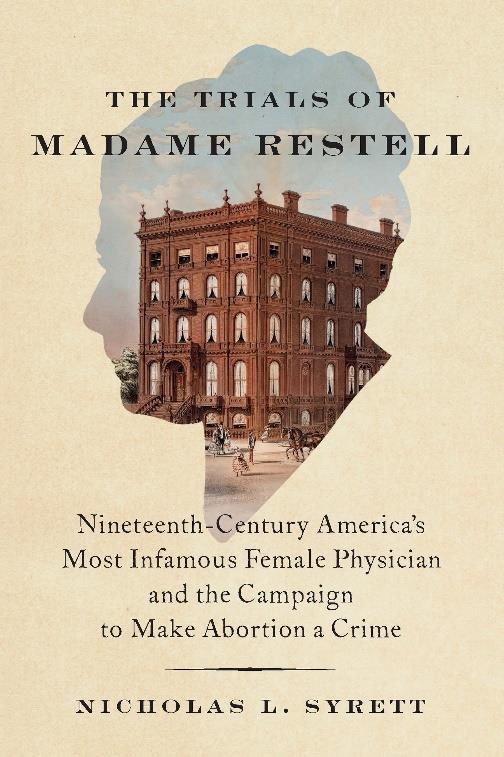
The Trials of Madame Restell
Nineteenth-Century America’s Most Infamous Female Physician and the Campaign to Make Abortion a Crime
Nicholas L. Syrett
October 31, 2023
Hardcover
352 pages
World, all languages
THE BIOGRAPHY OF ONE OF THE MOST FAMOUS ABORTIONISTS OF THE NINETEENTH CENTURY AND A STORY THAT HAS UNMISTAKABLE PARALLELS TO THE CURRENT WAR ON REPRODUCTIVE RIGHTS
For forty years in the mid-nineteenth century, “Madame Restell,” the nom de guerre of the most successful female physician in America, sold birth control medication, attended women during their pregnancies, delivered their children, and performed abortions in a series of clinics run out of her home in New York City. It was the abortions that made her famous. “Restellism” became the term her detractors used to indict her.
Restell began practicing when abortion was largely unregulated in most of the United States, including New York. But as a sense of disquiet arose about single women flocking to the city for work, greater sexual freedoms, changing views of the roles of motherhood and childhood, and fewer children being born to white, married, middle-class women, Restell came to stand for everything that threatened the status quo. From 1829 onward, restrictions on abortion began to put Restell in legal jeopardy. For much of this period she prevailed until she didn’t.
A story that is all too relevant to the current attempts to criminalize abortion in our own age, The Trials of Madame Restell paints an unforgettable picture of the changing society of nineteenth-century New York and brings Restell to the attention of a whole new generation of women whose fundamental rights are under siege.
Nicholas L. Syrett is associate dean and professor of women, gender, and sexuality studies at the University of Kansas. He is a co-editor of the Journal of the History of Sexuality and author of The Company He Keeps: A History of White College Fraternities, American Child Bride: A History of Minors and Marriage in the United States, and An Open Secret: The Family Story of Robert and John Gregg Allerton. His writing has also appeared in the New York Times, the Washington Post, and the Daily Beast. He lives in Lawrence, Kansas.
30
Praise for The Trials of Madame Restell:
“Syrett’s meticulously detailed account . . . offer[s] a portrait of a formidable woman navigating an era that, in several important respects, bears an unnerving resemblance to our own.”
The New Yorker
“A thorough and discerning political history of abortion in 19th-century New York City.”
Los Angeles Review of Books
“Compelling. . . . Thorough and well-researched.”
The Washington Post
“[Syrett] has written a thoroughly researched and scholarly account, blessedly free of academic jargon.”
The New York Review of Books
“The Trials of Madame Restell is a respectful, thorough portrait of a brave woman who defied her era ’s norms to give women reproductive options.”
Foreword Reviews
“A richly detailed biography of a defiant woman.”
Kirkus Reviews
“In this illuminating narrative . . . Syrett reveals an entire underground industry that flourished in 19th-century American cities, and tracks the rise of opposition to women’s reproductive care over time. It’ s an eye-opening account.”
Publishers Weekly
“In an era when men of law and medicine were aggressively eliminating women’s sexual and medical rights, Madame Restell was one of the few women who dared to openly defy them. She earned international notoriety and a small fortune providing birth control, abortions, and a refuge for pregnant women who had nowhere else place to turn. But Nicholas Syrett’s account of Madame Restell’s extraordinary career and tragic ending could be ripped from today’ s headlines. Anyone who wants to understand the current conflagrations over abortion needs to read The Trials of Madame Restell. ”
Debby Applegate, Pulitzer Prize–winning author of The Most Famous Man in America: The Biography of Henry Ward Beecher
“Nicholas Syrett digs deep to present for the first time a fully three-dimensional Madame Restell, the legendary nineteenth-century New Yorker whose name became a national synonym for abortion ‘Restellism’ for three decades and beyond. Syrett probes behind the hype of scandal-driven newspapers to portray a committed female physician providing contraception and abortion services to probably hundreds of women each year. And how did the authorities treat the Madame? Read on, to learn about this surprising chapter of America’s abortion history.”
Patricia Cline Cohen, author of The Murder of Helen Jewett: The Life and Death of a Prostitute in Nineteenth-Century New York
31
“The Trials of Madame Restell takes readers on a fascinating and timely journey through four decades of Restell’s pioneering medical practice and constant legal predicaments in a rapidly changing New York City. Syrett’s historical sleuthing through legal records, archives, and newspaper accounts paints a complex portrait of Restell and the society that vilified her, and brings antebellum and Gilded Age New York to life.”
Tom Meyers, co-host of The Bowery Boys Podcast
“This extraordinary and compelling story of the trials of Madame Restell will thoroughly engage you, totally enrage you, and hopefully persuade you to join her courageous legacy and fight for women to have control over their bodies and lives.”
V (formerly Eve Ensler), author of The Vagina Monologues and Reckoning
“Nicholas Syrett’ s The Trials of Madame Restell is as illuminating as it is haunting. [In this] careful historical reconstruction of abortion, midwifery, and women’s reproductive healthcare in the nineteenth century told through the life of one New York woman, Syrett makes clear that the right to choose has been used by men as a tool to control women for centuries. Madame Restell is an unforgettable character: feminist, progressive, social justice warrior, and shrewd businesswoman. Her very life embodies a fight over women ’s rights that has gone on for far too long. I read this book aghast, breathless, enraged every sentence a whisper of our world today.”
Rachel Louise Snyder, author of No Visible Bruises and Women We Buried, Women We Burned
“
Famous, infamous, and undaunted, Madame Restell believed fiercely in the right of nineteenthcentury women to control their own bodies. A savvy entrepreneur, a wife, and a mother, Restell was also an unceasing target of the press, the police, and the courts. In this compelling book, Nicholas Syrett gives us an all-too-timely tale of the untimely demise of an unconventional woman. ”
Martha Hodes, author of My Hijacking: A Personal History of Forgetting and Remembering
“Conjuring the fracturing social world of mid-nineteenth-century New York decades that changed how Americans lived, loved and worked Nicholas Syrett’s extraordinary account of the many assaults on Madame Restell, the city’s most notorious abortionist, reminds us of the horrifying costs in our ongoing struggles over women’s bodies and reproductive rights. It’ s a battle that is not yet over.”
Ann Fabian, author of The Skull Collectors: Race, Science, and America’s Unburied Dead
“‘Are we not bound by every obligation, human and divine . . . to guard, to protect our health, nay our life’ is how Madame Restell advocated for contraception and abortion publicly in the year 1839! We honor this inspirational provider ancestor when we learn her story, uplift the good she did, and build on her legacy of fierce resistance.”
—Viva Ruiz, founder of the Thank God for Abortion initiative
32
History
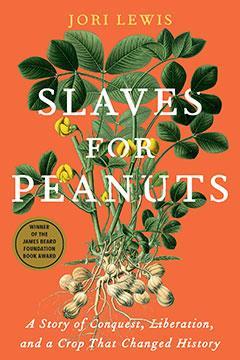
Slaves for Peanuts
A Story of Conquest, Liberation, and a Crop That Changed History
Jori Lewis
October 8, 2024
Paperback
384 pages
World, all languages
THE WINNER OF THE JAMES A. BEARD FOUNDATION BOOK AWARD AND HARRIET TUBMAN PRIZE
“A complex story crossing time and oceans” (National Public Radio), Jori Lewis’s prizewinning Slaves for Peanuts deftly weaves together the natural and human history of a crop that transformed the lives of millions. “With elegant prose and engaging details” (Pulitzer Prize–winner Imani Perry), Lewis reveals how demand for peanut oil in Europe ensured that slavery in Africa would persist well into the twentieth century, long after the European powers had officially banned it in the territories they controlled.
“This informative and compassionate account unearths a little-known chapter in the history of slavery and European imperialism” (Publishers Weekly), recreating a world on the coast of Africa that is breathtakingly real and unlike anything modern readers have experienced. Slaves for Peanuts is “told in rich detail through the eyes of West African men and women” (Civil Eats) from an African-born French missionary harboring runaway slaves, to the leader of a Wolof state navigating the politics of French imperialism who challenge our most basic assumptions of the motives and people who supported human bondage.
At a time when Americans are grappling with the enduring consequences of slavery, here is a new and revealing chapter in its global history.
Jori Lewis is an award-winning journalist who writes about agriculture and the environment. Her reports have appeared on PRI’ s The World and in Discover Magazine, Pacific Standard, and the Virginia Quarterly Review. She is also a contributing editor of Adi, a literary magazine about global politics. In 2018, she received the prestigious Whiting Grant for Creative Nonfiction. Lewis splits her time between Illinois and Senegal
33
Praise for Slaves for Peanuts:
“A rich and very readable overview of people and peanuts in nineteenth-century West Africa.”
World Literature Today
“Slaves for Peanuts is a valuable addition to agricultural and West African history.”
Nature
“The geopolitical game Lewis describes in Slaves for Peanuts is an old one, and one essential to the formation of the modern world.”
Africa Is a Country
“Slaves for Peanuts plumbs a fascinating and disturbing slice of history, shining a light on another glaring example of Western hypocrisy and oppression.”
NPR Books
“[Slaves for Peanuts] unearths the stories of African kingdoms and colonial settlements, showing how demand for peanut oil in Europe drove the expansion of the peanut trade in Senegal in the 19th century and ensured that slavery and indentured labor in West Africa would continue long after the Europeans had abolished it.”
Civil Eats
“Astute and distressing. . . . This informative and compassionate account unearths a littleknown chapter in the history of slavery and European imperialism.”
Publishers Weekly
“In this whirlwind tour with the yellow-blossomed peanut across the Atlantic world, journalist Jori Lewis skillfully unveils the intertwined and troubling trajectory of plants, people, slavery, and colonialism. Slaves for Peanuts is a broad, complex, and unexpected environmental history vibrantly told.”
Tiya Miles, professor of history, Harvard University, and author of All That She Carried
“Slaves for Peanuts is a revelation. With elegant prose and engaging details, Lewis uncovers a vital history that promises to transform our understanding of slavery and colonialism. Though focused on a single crop, this terrain is vast and deep. I highly recommend this outstanding work.”
Imani Perry, Hughes-Rogers Professor of African American Studies, Princeton University, and author of Breathe
“Jori Lewis’s superbly readable book does more than bring life to something we all too often ignore: the history of slavery in Africa. She has also found a sort of African version of the Underground Railroad. And all of this is connected to an everyday food whose history we seldom think of.”
—Adam Hochschild, journalist, historian, lecturer, and bestselling author of King Leopold’s Ghost
34
“Within these pages, you’ll encounter plagues and palace intrigues, adventures and misadventures, kingmakers and kingbreakers, fortunes won and lost all wrapped around the mighty peanut! In well-researched, engaging prose, Jori Lewis unravels the intimate connections between this major export crop, enslavement, and abolition on Senegambian soil. The wars fought over it, and the history that surrounds it. This work is an important contribution to African historiography.”
Sandra Jackson-Opoku, author of The River Where Blood Is Born and co-editor of Revise the Psalm
“Slaves for Peanuts is an extraordinary and often tender work of meticulous research that spans time and continents, an insightful and captivating narrative of how slavery in Africa supported industrialization in the West, and how enslaved people took back their freedom. I am in awe of the authoritative care with which Jori Lewis lays out the entangled relationships between white supremacy, capitalism, food, and the indefatigable human agency. A must-read that illustrated the long-standing history of the many ways in which the African continent has been for centuries paying the price for the comforts of the Global North.”
Anna Badkhen, author of Fisherman’s Blues
“Jori Lewis has achieved the nearly impossible task of educating us about peanuts, a vegetable juggernaut that has changed the world, while recounting stories of slavery and freedom, all presented with extraordinary nuance and humanity. Slaves for Peanuts is a triumph of deep research and engaging writing.”
Andrés Reséndez, professor, department of history, University of California, Davis, and author of The Other Slavery
“In this magnificently researched, beautifully told narrative history, Jori Lewis brings the roiling story of slavery and liberation in West Africa to life. By combing through stacks of archived documents on three continents, she masterfully weaves a rich tale of African kingdoms and European ‘civilizers’; of unbathed Englishmen and mystical priestesses; of camel caravans and railroad bandits; of imperial decrees, epic poems, and forests in the mist. At the center of it all stands the towering figure of an African protestant pastor and liberator; and, not far away, the fertile soils that would send the humble, mighty peanut to distant shores, and into history.”
—Sandy Tolan, professor of journalism, USC Annenberg, and bestselling author of The Lemon Tree
35
Labor and Union Movements
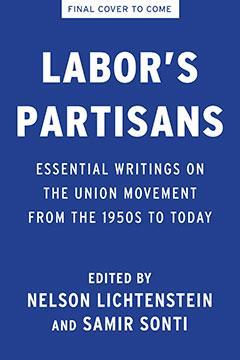
Labor’s Partisans
Essential Writings on the Union Movement from the 1950s to Today
Nelson Lichtenstein and Samir Sonti
February 4, 2025
Hardcover
256 pages
World, all languages
THE TOP WRITERS ON LABOR PROVIDE VITAL HISTORICAL CONTEXT FOR THE CURRENT UPSURGE IN UNION ORGANIZING
In 1954, the American labor movement reached its historic height, with one-third of all non-agricultural workers belonging to a union and much higher percentages in the nation’s key industries. That same year, a group of socialists, many of them with close ties to labor, founded a small magazine called Dissent.
Over the next seventy years, Dissent would become the publishing home for the most important progressive voices on American unions writers who pushed the labor movement towards a more democratic, inclusive, and expansive vision. Today, at a time of both resurgent union organizing and socialist politics, the need for this rich tradition of ideas is as pressing as ever.
With over twenty-five contributions by some of the nation’s most influential progressive voices, Labor’s Partisans brings to life a history of labor that is of immediate relevance to our own times. Introduced and edited by leading labor historians Nelson Lichtenstein and Samir Sonti, this essential volume reveals the powerful currents and debates running through the labor movement, from the 1950s to today.
Combining stunning writing, political passion, and deep historical perspective, Labor’s Partisans will be a source of ideas and inspiration for anyone concerned with a more just future for working people.
Authors Included:
Daniel Bell
W.H. Benson
Eileen Boris
David Brody
Thomas R. Brooks
Dorothy Sue Cobble
Melvyn Dubovsky
Liza Featherstone
Steve Fraser
Michael Harrington
Paul Jacobs
Tammy Kim
Jennifer Klein
Gabriel Kolko
William Kornblum
Gordon Lafer
Sid Lens
Jack Metzgar
Ruth Milkman
Carl Shier
Harvey Swados
John Sweeney
Robert Ross
Dan Wakefield
Nelson Lichtenstein is a professor of history at the University of California, Santa Barbara, and the director of the Center for the Study of Work, Labor, and Democracy. He is the author of many books, including Walter Reuther, Labor’s War at Home, and State of the Union, as well as Wal-Mart (The New Press). He lives in Santa Barbara.
Samir Sonti is an organizer and assistant professor at the CUNY School of Labor and Urban Studies. He lives in New York.
36
Labor and Union Movements
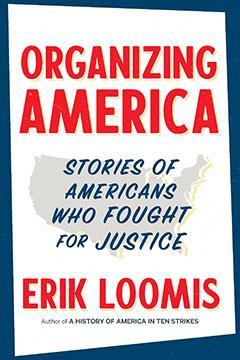
Organizing America
Stories of Americans Who Fought for Justice
Erik Loomis
March 11, 2025
Hardcover
304 pages
World, all languages
From the author of A History of America in Ten Strikes, Organizing America is a series of biographical chapters on organizing from the nation’s many social movements.
Organizing America first demythologizes historical organizers. Too often we see the past as a Mount Rushmore, in which King and Parks and Chavez and Douglass are larger-than-life figures. This myth is often detrimental because it forces us to negatively compare our contemporary organizing to an almost impossible standard. Instead, Loomis encourages readers to appreciate the humanity of these individuals, and the similarities in the challenges they faced that we still see today. He then goes on to theorize organizing, reminding readers of the core principles of organizing and to follow in the footsteps of the past. Lastly, Loomis discusses the principles of solidarity and pushes readers towards thinking about collective action rather than the individualized and atomized politics that we so often see today.
Erik Loomis is an associate professor of history at the University of Rhode Island. He blogs at Lawyers, Guns, and Money on labor and environmental issues past and present. His work has also appeared in the New York Times, the Washington Post, Dissent, and the New Republic
The author of Out of Sight and A History of America in Ten Strikes (both from The New Press) as well as Empire of Timber, he lives in Providence, Rhode Island.
37
Photography and LGBTQ

Transcend
Freedom to Love
Sandra Chen Weinstein
January 7, 2025 Paperback
144 pages
World, all languages
THE LATEST IN THE
GROUNDBREAKING
SERIES OF PHOTOBOOKS ON LGBTQ LIFE AROUND THE WORLD, AN INTIMATE, PERSONAL COLLECTION OF PHOTOGRAPHS ON THE QUEER COMMUNITY IN THE U.S.
“Sandra Chen Weinstein’s images often artfully framed, with a disarming intimacy reveal a vibrant, complicated community, one we rarely see in the American press.” Carol McCusker, curator of photography, Harn Museum of Art
Recent years have seen an unprecedented push by state legislatures to pass anti-LGBTQ bills across the United States. Hundreds of laws, mainly attempting to ban access to gender-affirming healthcare for transgender youth and to ban discussions of gender identity and sexuality from high school curriculums, have been introduced this year alone a new and deeply troubling record.
In these times, visual representation of queer love is as important as it has ever been, and in Transcend, award-winning Taiwanese-American photographer Sandra Chen Weinstein showcases some of the work from a long career of photographing the LGBTQ community, especially the trans community. Weinstein’s own child recently came out as queer, trans, and non-binary at the age of twenty-eight, and the core of the book is a series of photographs that focuses on their relationship.
A gorgeously packaged, full-color book, Transcend challenges many assumptions about LGBTQ life in the United States and is an enduring visual testament to the strength, resilience, and joy of the queer community in the face of discrimination, inequality, and violence.
Transcend was designed by Emerson, Wajdowicz Studios (EWS).
Sandra Chen Weinstein is an award-winning documentary photographer. She has been nominated for the Prix Pictet, and her work has been exhibited in the Recontres d’Arles, the Phillips Collection, the Washington County Museum of Fine Arts, Aperture Gallery, and more. She splits her time between Virginia and California.
38

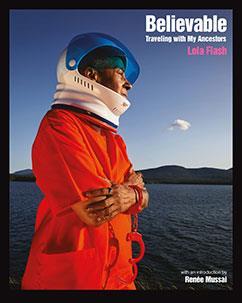


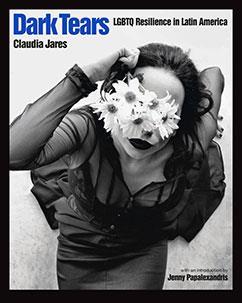
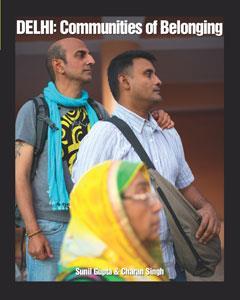
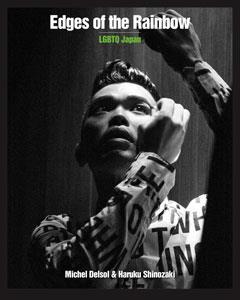


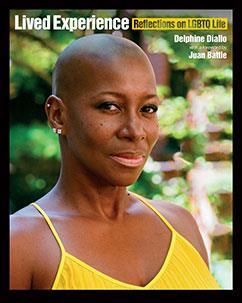

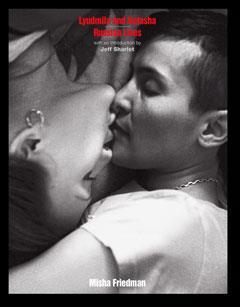
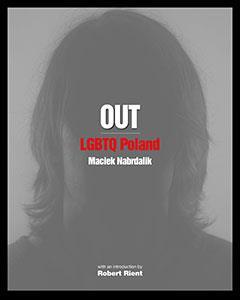
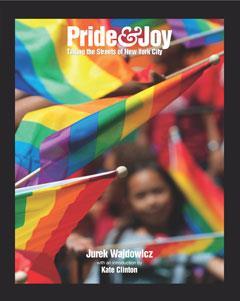
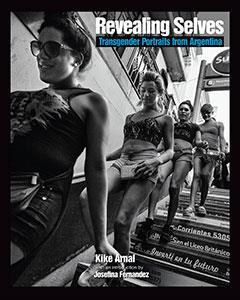
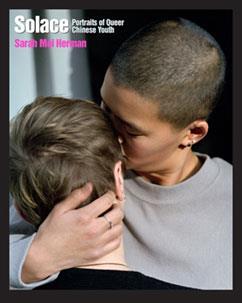
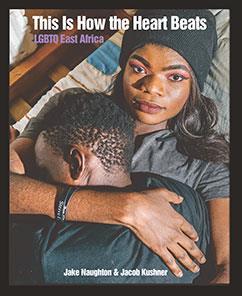

39
LGBTQ Photojournalism Backlist Titles
Studs Terkel Backlist—Celebrating the 5oth Anniversary for Working and 40th Anniversary for “The Good War”

And They All Sang
Adventures of an Eclectic Disc Jockey Studs Terkel
The Pulitzer Prize winner’ s “latest indispensable oral history” (The New York Times) of the twentieth century’ s most celebrated musicians
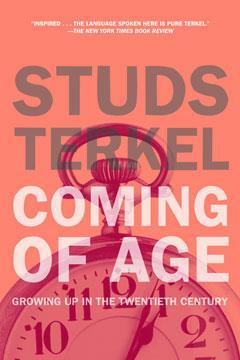

Coming of Age
Growing Up in the Twentieth Century Studs Terkel
“Inspired . . . the language spoken here is pure Terkel.” The New York Times Book Review

American Dreams
Lost and Found
Studs Terkel
“Here is the raw material for one thousand novels . . . incomparable.” Margaret Atwood
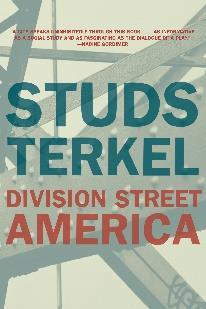
Division Street America
Studs Terkel
A new paperback edition of the groundbreaking book that first made Studs Terkel a household name Giants of Jazz Studs Terkel
A beautifully illustrated edition of Studs Terkel’s timeless portraits of America’ s jazz legends, for readers of all ages

“The Good War”
An Oral History of World War II Studs Terkel
The Pulitzer Prize–winning classic, with a new preface by the author
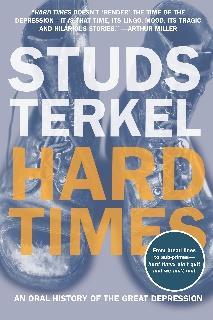
Hard Times
An Oral History of the Great Depression Studs Terkel
In this unique recreation of one of the most dramatic periods in modern American history, Studs Terkel recaptures the Great Depression of the 1930s in all its complexity
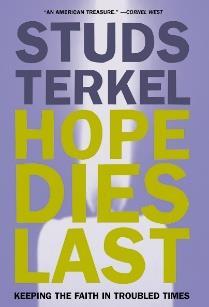
Hope Dies Last
Keeping the Faith in Troubled Times Studs Terkel
The latest oral history from the unrivaled master of the genre
40

The Studs Terkel Reader
My American Century Studs Terkel
A new addition to the collection of elegant reissues of the Studs Terkel oeuvre
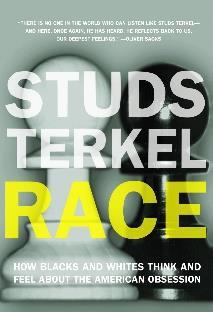

The Studs Terkel Interviews Film and Theater
Studs Terkel
An elegant new edition of the Pulitzer Prize winner’ s “richly entertaining” (Publishers Weekly) conversations with the masters of stage and screen
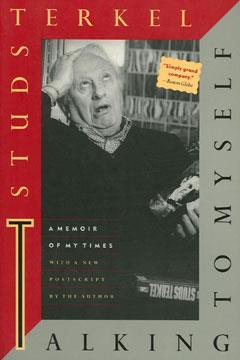
Talking to Myself
A Memoir of My Times
Studs Terkel
The autobiographical portrait of our leading oral historian
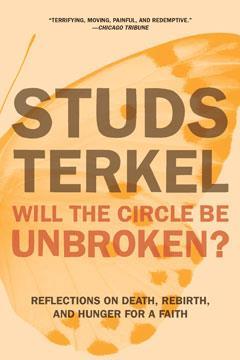
Will the Circle Be Unbroken? Reflections on Death, Rebirth, and Hunger for a Faith Studs Terkel
An indispensable oral history from the Pulitzer Prize–winning author dealing with the universal experience of death

Race
How Blacks and Whites Think and Feel About the American Obsession Studs Terkel
A landmark book the first title ever published by The New Press now with a new introduction by Gary Younge that brings Terkel’s poignant portraits of how race is lived in America to bear on today’ s shifting cultural and political landscape
Touch and Go A Memoir
Studs Terkel
The extraordinary, widely praised memoir “a masterpiece about a life which itself is a sort of masterpiece” (Oliver Sacks)
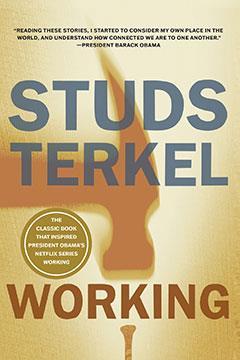
Working People Talk About What They Do All Day and How They Feel About What They Do Studs Terkel
Studs Terkel’s classic oral history of Americans’ working lives and the inspiration for Barack Obama’ s new Netflix series about work in the twenty-first century
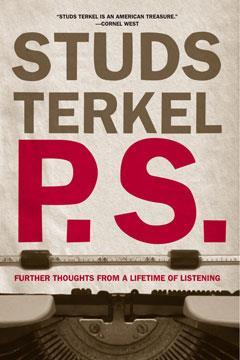
P.S.
Further Thoughts from a Lifetime of Listening Studs Terkel
The Pulitzer Prize–winning oral historian and nonagenarian makes a selection of his favorite unpublished writings, broadcasts, and interviews
41
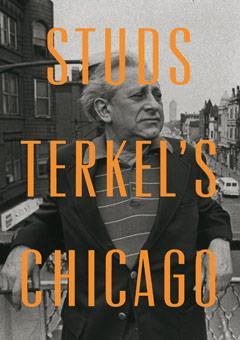
Studs Terkel’s Chicago Studs Terkel
NEW ILLUSTRATED EDITION The classic homage to one of America’s greatest cities, by the celebrated oral historian and cultural icon, the late Studs Terkel
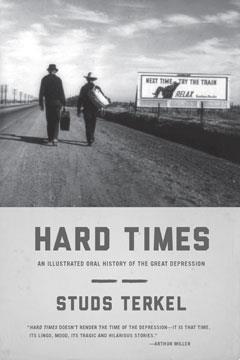
Hard Times
An Illustrated Oral History of the Great Depression Studs Terkel
The masterpiece that brings to life an era that resonates all too well with the current moment, reissued in a stunning new edition with documentary photographs from the celebrated Farm Security Administration archive
42
Noam Chomsky Backlist

American Power and the New Mandarins
Historical and Political Essays Noam Chomsky
Back in print, the seminal work by “arguably the most important intellectual alive” (The New York Times)

Objectivity and Liberal Scholarship Noam Chomsky
Chomsky’s classic critique of the ideology of liberalism that justified American imperialist foreign policy during the 1960s a critique that remains relevant to this day
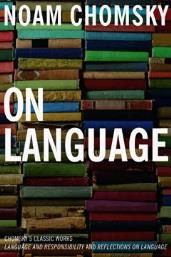
On Language
Chomsky’s Classic Works Language and Responsibility and Reflections on Language Noam Chomsky
Two of Chomsky’s most famous and accessible works available in an affordable and attractive new paperback edition
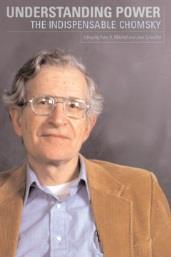
Understanding Power
The Indispensable Chomsky Noam Chomsky
The perfect introduction to the wideranging thought of “the most widely read voice on foreign policy on the planet” (The New York Times Book Review)
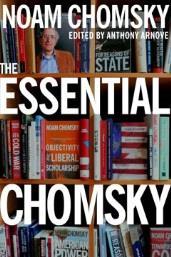

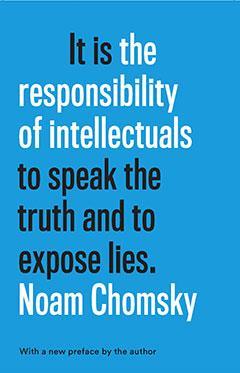
The Essential Chomsky Noam Chomsky
The seminal one-volume collection of Noam Chomsky’s thought, encompassing his best writings on politics, philosophy, and media theory
On Anarchism Noam Chomsky
The definitive primer on anarchist thought and practice, from the thinker the New York Times Book Review calls “the most widely read voice on foreign policy on the planet”
The Responsibility of Intellectuals Noam Chomsky
In one of his most famous essays, Noam Chomsky lays out the idea that intellectuals’ relative privilege imbues them with greater responsibility one that was to be the guiding principle of his intellectual life
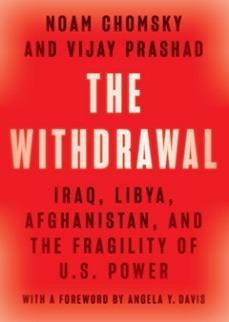
The Withdrawal Iraq, Libya, Afghanistan, and the Fragility of U.S. Power Noam Chomsky and Vijay Prashad
Two of our most celebrated intellectuals grapple with the uncertain aftermath of the American collapse in Afghanistan
43
Antiracist Bestsellers
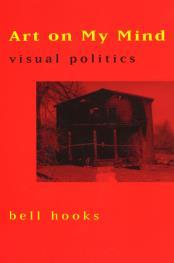
Art on My Mind Visual Politics bell hooks
“As erudite and sophisticated as hooks is, she is also eminently readable, even exhilarating.” Booklist
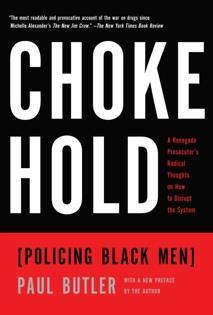
Chokehold Policing Black Men
Paul Butler
With the eloquence of Ta-Nehisi Coates and the persuasive research of Michelle Alexander, a former federal prosecutor explains how the system really works, and how to disrupt it
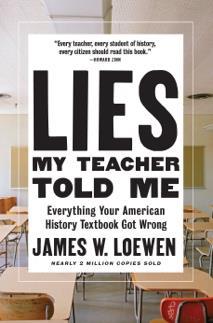
Lies My Teacher Told Me
Everything Your American History Textbook Got Wrong
James W. Loewen
A new edition of the national bestseller and American Book Award winner, with a new preface by the author
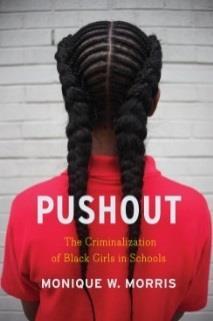
Pushout
The Criminalization of Black Girls in Schools
Monique W. Morris
The “powerful” (Michelle Alexander) exploration featured by The Atlantic, Essence, the Washington Post, New York magazine, NPR, the New Republic, and the Tom Joyner Morning Show of the harsh and harmful experiences confronting black girls in schools
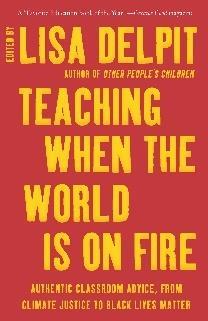
Teaching When
the
World
Is
on Fire Authentic Classroom Advice, from Climate Justice to Black Lives Matter
Edited
by Lisa Delpit
A timely collection of advice and strategies for creating a just classroom from educators across the country, handpicked by MacArthur Genius and bestselling author Lisa Delpit
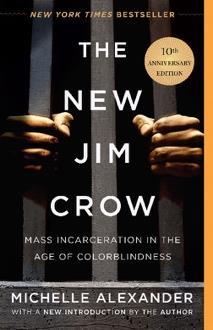
The New Jim Crow Mass Incarceration in the Age of Colorblindness
Michelle Alexander
A tenth-anniversary edition of the iconic bestseller “one of the most influential books of the past 20 years,” according to the Chronicle of Higher Education with a new preface by the author
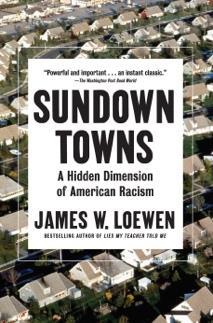
Sundown Towns
A Hidden Dimension of American Racism
James W. Loewen
The award-winning look at an ugly aspect of American racism by the bestselling author of Lies My Teacher Told Me, reissued with a new preface by the author
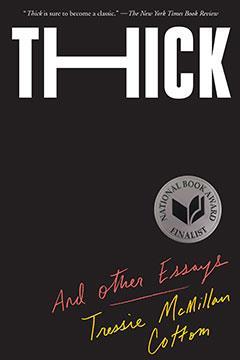
Thick And Other Essays
Tressie McMillan Cottom
As featured by The Daily Show, NPR, PBS, CBC, Time, VIBE, Entertainment Weekly, Well-Read Black Girl, and Chris Hayes, “incisive, witty, and provocative essays” (Publishers Weekly) by one of the “most bracing thinkers on race, gender, and capitalism of our time” (Rebecca Traister), now in paperback
44
Select Bestselling Backlist

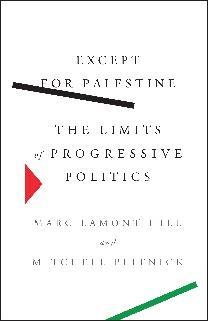
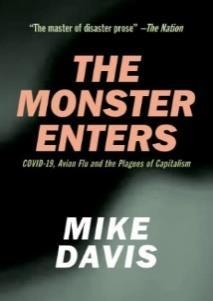
Conspiracy in the Streets
The Extraordinary Trial of the Chicago Seven
Jon Wiener
Reprinted to coincide with the release of the new Aaron Sorkin film, this book provides the political background of this infamous trial, narrating the utter craziness of the courtroom and revealing both the humorous antics and the serious politics involved
Except for Palestine
The Limits of Progressive Politics
Marc Lamont Hill and Mitchell Plitnick
A bold call for the American Left to extend their politics to the issues of Israel-Palestine
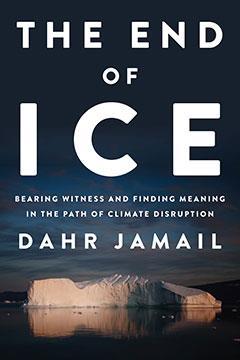
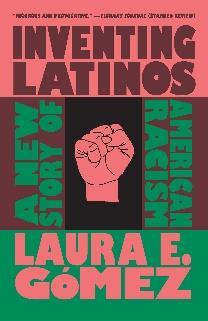
The Monster Enters
COVID-19, Avian Flu and The Plagues of Capitalism
Mike Davis
“
Provocative and controversial, as always, and a worthy addition to the literature of plague and pestilence.” Kirkus Reviews
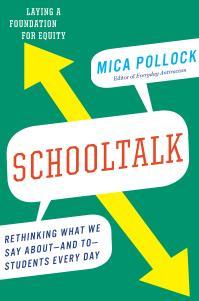
The End of Ice
Bearing Witness and Finding Meaning in the Path of Climate Disruption
Dahr Jamail
Acclaimed on its hardcover publication, a global journey that reminds us “of how magical the planet we’ re about to lose really is” (Bill McKibben)
Inventing Latinos
A New Story of American Racism
Laura E. Gómez
An NPR Best Book of the Year, exploring the impact of Latinos’ new collective racial identity on the way Americans understand race, with a new afterword by the author
Schooltalk
Rethinking What We Say About and to Students Every Day
Mica Pollock
An essential guide to transforming the quotidian communications that feed inequality in our schools from the award-winning editor of Everyday Antiracism

Troublemakers
Lessons in Freedom from Young Children at School
Carla Shalaby
A radical educator’s paradigm-shifting inquiry into the accepted, normal demands of school, as illuminated by moving portraits of four young “problem children”

When We Were Arabs
A Jewish Family’s Forgotten History
Massoud Hayoun
The stunning debut of a brilliant nonfiction writer whose vivid account of his grandparents’ lives in Egypt, Tunisia, Palestine, and Los Angeles reclaims his family’s Jewish Arab identity
45
Must-Have Historical Releases
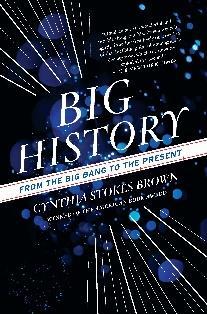
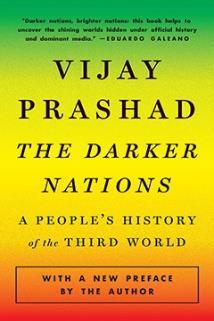
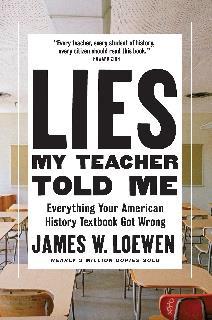
Big History
From the Big Bang to the Present
Cynthia Stokes Brown
NEW AND REVISED EDITION Jared Diamond meets Stephen Hawking in a book that fits human history into the history of the universe, by an American Book Award winner
The Darker Nations
A People’s History of the Third World
Vijay Prashad
The landmark alternative history of the Cold War from the perspective of the Global South, reissued in paperback with a new introduction by the author
Lies My Teacher Told Me
Everything Your American History
Textbook Got Wrong
James W. Loewen
A new edition of the national bestseller and American Book Award winner, with a new preface by the author
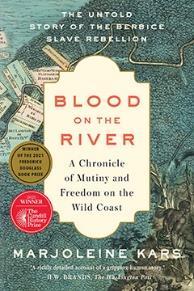
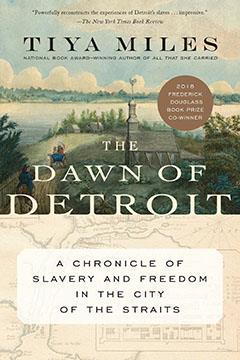
Blood on the River
A Chronicle of Mutiny and Freedom on the Wild Coast Marjoleine Kars
The winner of the 2021 Cundill History Prize and the 2021 Frederick Douglass Book Prize
The Dawn of Detroit
A Chronicle of Slavery and Freedom in the City of the Straits
Tiya Miles
The prizewinning, nationally celebrated account of the slave origins of a major northern city

A People’s History of Sports in the United States
250 Years of Politics, Protest, People, and Play
Dave Zirin
From the author Robert Lipsyte calls “the best young sportswriter in America,” a rollicking, rebellious, myth-busting history of sports in America that puts politics in the ring with pop culture
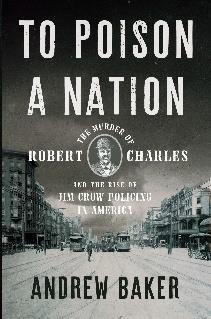
To Poison a Nation
The Murder of Robert Charles and the Rise of Jim Crow Policing in America Andrew Baker
An explosive, long-forgotten story of police violence that exposes the historical roots of today’s criminal justice crisis
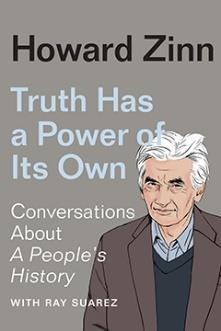
Truth Has a Power of Its Own Conversations About A People’s History
Howard Zinn with Ray Suarez
“
Free-wheeling and illuminating. . . . A readable and nondogmatic book that will appeal to young people especially as a way to rethink conventional history.”
Kirkus Reviews
46












